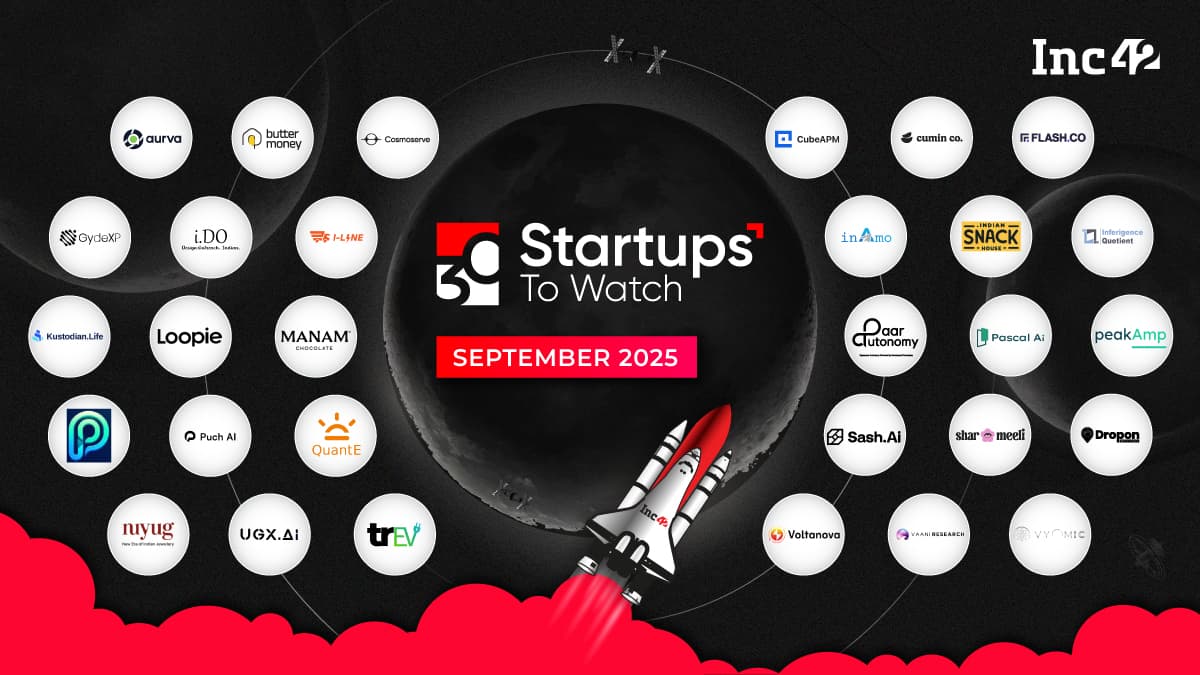September was a month of pronounced contrasts for India’s startup ecosystem. While the RBI ordered BNPL firm Simpl to immediately halt its payments operations for running without its explicit authorisation, the Trump administration’s $100K fee for new H-1B visa applicants created anxiety among founders regarding their ability to recruit and retain highly-skilled global talent for their US operations.
Despite these headwinds, investor confidence remained undeterred. The Indian startup ecosystem reached the $1 Bn funding mark in September, up more than 36% from $733 Mn raised in August, while the blockbuster IPO of Urban Company brought much-needed cheer for Indian founders.
Prominent late stage startups preparing for their own D-Street debuts doubled the optimism. Fintech giants like Groww and edtech behemoth PhysicsWallah inched closer to their public listings, while others like LEAP India, PhonePe and Purple Style Labs filed their DRHPs with the SEBI.
While the spotlight firmly remains on these late stage giants making their way to the bourses, early stage startups continue to hum with transformative energy and innovation.
From AI and deeptech to SaaS and defence tech, homegrown new-age tech ventures continue to push the boundaries and fuel India’s growth story.
Against this backdrop, we are back with the 30 Startups To Watch — Inc42’s monthly roundup of some of the most-promising early stage ventures — for September 2025.
In the 63rd edition of Inc42’s flagship series, we have yet again spotlighted startups breaking every ground — from spacetech to AI and from D2C to quick commerce.
Now, let’s jump right into the September edition of our definitive list.
Editor’s Note: The list below is not a ranking but rather a window into ventures that have caught our eye this month.
Aurva | Simplifying AI-Driven Data Security For Enterprises

As enterprises deploy AI agents to automate complex workflows, a new challenge has emerged – securing sensitive data in real time.
As these AI agents often access critical systems, legacy access tools – which rely on static rules or periodic log analysis – are proving inadequate. These deficiencies create significant blind spots in data activity, and compromise accountability, visibility, and auditability.
This exposure leaves companies vulnerable to catastrophic data breaches, non-compliance with stricter global regulations, and unnecessary operational inefficiencies.
Ex-Meta engineers Apurv Garg and Krishna Bagadia founded Aurva in 2023 to tackle this challenge. Aurva offers a real-time data security platform that tracks all interactions with sensitive information and ties each action to verified users.
Its integrated dashboard offers actionable insights, anomaly alerts, and compliance-ready audit trails. Enterprises can dynamically enforce security policies while keeping operations smooth across cloud, SaaS, and on-premise environments.
Aurva focusses on high-security sectors like fintech, banking, SaaS, and large tech companies, where cyber fraud is rising rapidly. With increasing regulatory scrutiny and growing reliance on AI, demand for real-time data security is at its all-time high.
At the heart of all this is the Indian cybersecurity market, which is expected to reach $36.8 Bn by 2033, growing at a 15.8% CAGR. This offers startups like Aurva a big opportunity to reshape enterprise security.
Butter Money | Making Home Loans Fast & Transparent
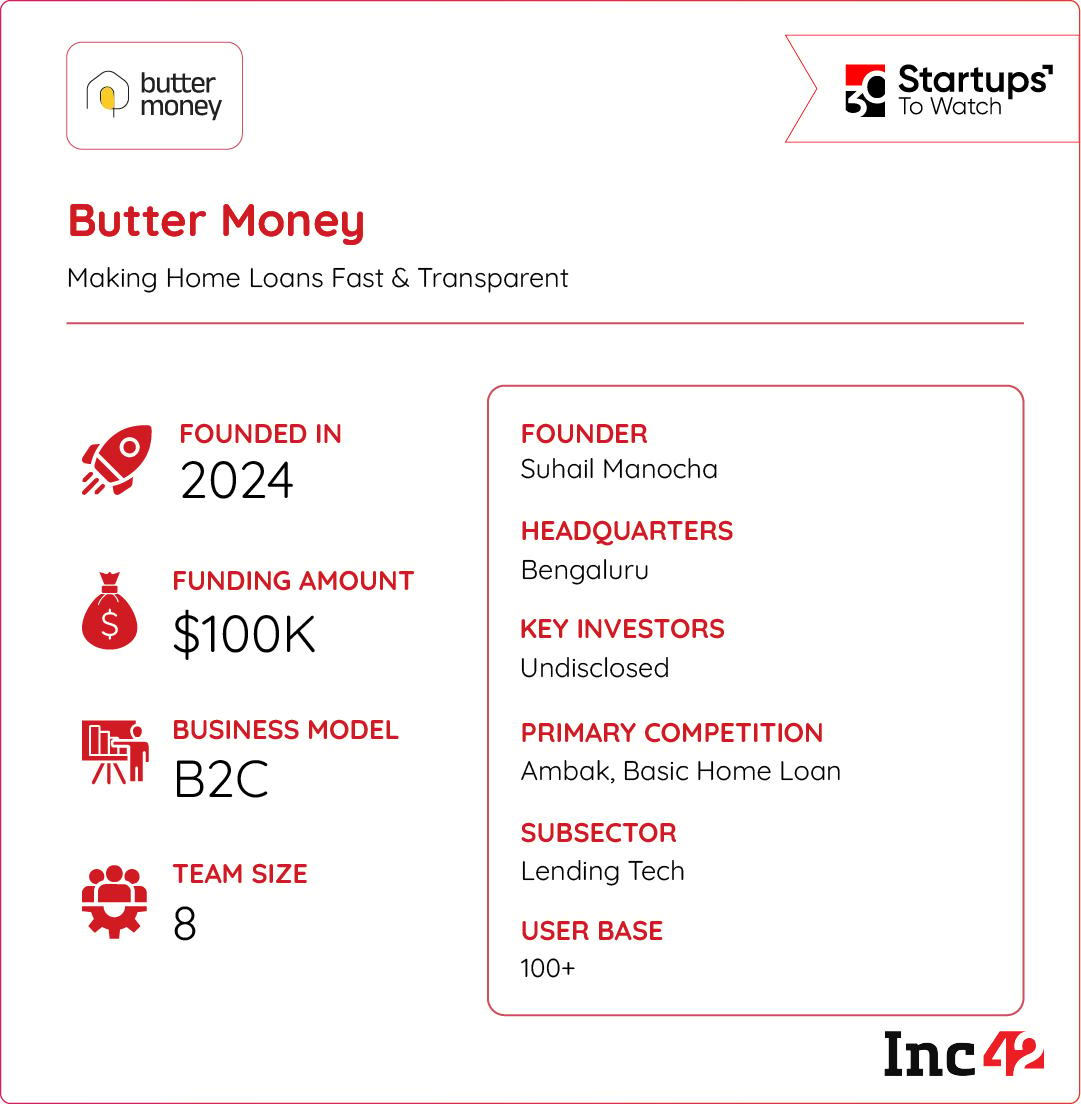
Every year, nearly 40 Lakh Indians seek home loans, but the process remains slow, opaque, and complicated. Lengthy paperwork, drawn-out approvals, and unclear options make homeownership a stressful journey for many, despite financial institutions’ efforts to streamline lending.
Butter Money, founded in December 2024 by ex-Antler entrepreneur-in-residence Suhail Manocha, aims to make home loans transparent, fast, and hassle-free. The Bengaluru-based fintech digitises the entire home loan journey, letting users compare options from over 125 banks, discover personalised interest rates, and access easy-to-understand educational content.
The platform also speeds up document collection and verification. With AI-powered decisioning, Butter Money helps applicants move from application to approval far more efficiently.
India’s home loan market is growing rapidly. With digital adoption still in its early stages and many borrowers seeking clarity and speed, Butter Money is set to capture a significant share of this expanding market and redefine the home loan experience in India.
Cosmoserve Space | On A Mission Against Space Debris
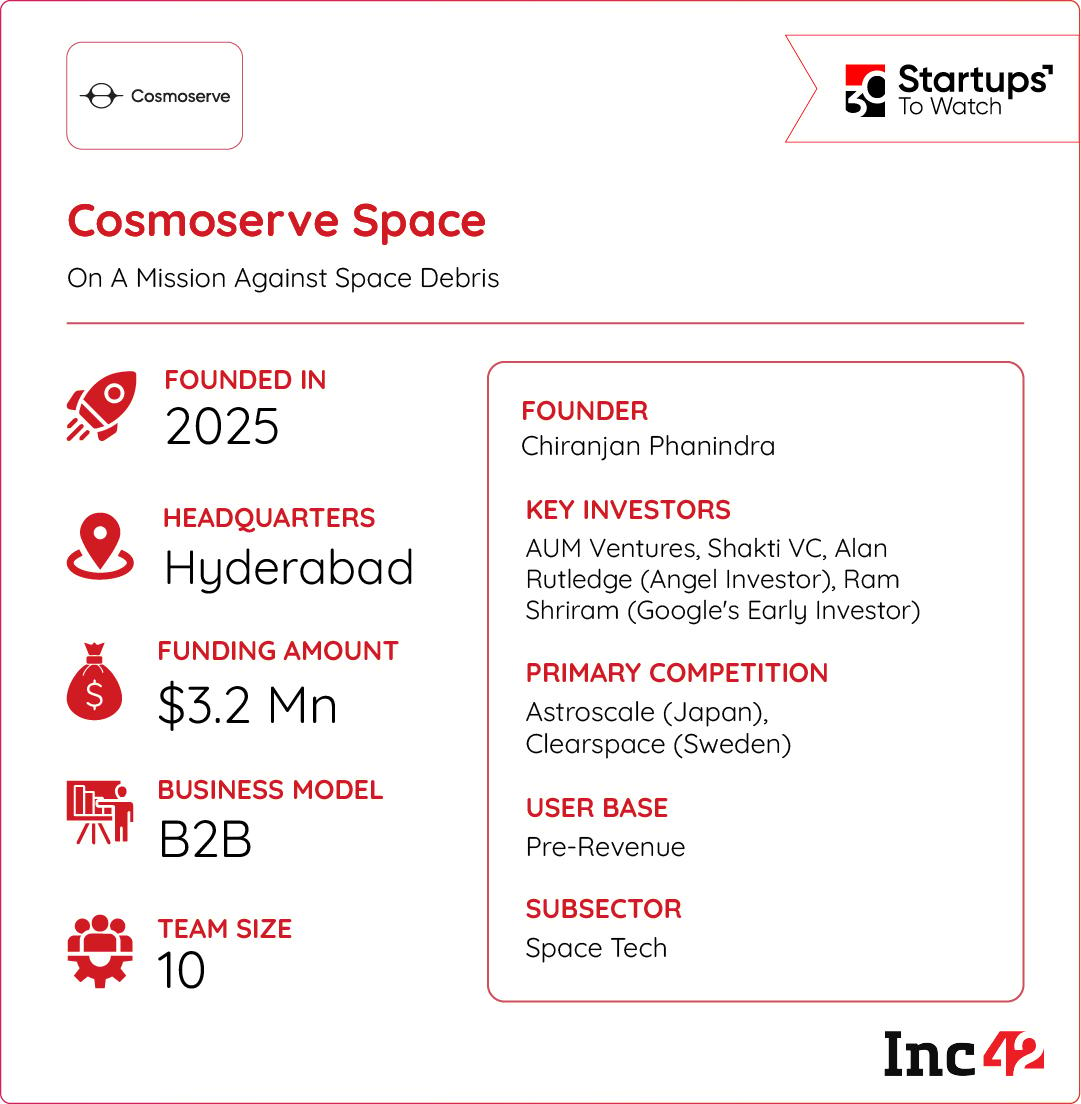
As space exploration grows, so does the risk from space debris. With India ramping up its spacetech capabilities, managing orbital debris has become critical for the safety and sustainability of space operations.
Cosmoserve Space, founded earlier this year by ISRO veteran and IIT-Madras alumni Chiranjeevi Phanindra B, is developing technology to clean Earth’s orbit. The startup is designing a retriever spacecraft to identify, track and clear hazardous objects, ensuring long-term operational safety for satellites and space missions.
Backed by investors like Asia Venture Capital Forum, AUM Ventures, and T-Hub, the startup’s founding team also includes Skyroot Aerospace cofounder and CEO Pawan Kumar Chandana.
Once regulatory approvals and tests are complete, Cosmoserve aims to serve government space agencies, private satellite operators, and commercial space enterprises worldwide.
Cosmoserve has a significant growth opportunity ahead of it, as it operates in the space debris removal market, expected to breach the $2 Bn mark by 2033.
CubeAPM | Real-Time App Insights For Enterprises
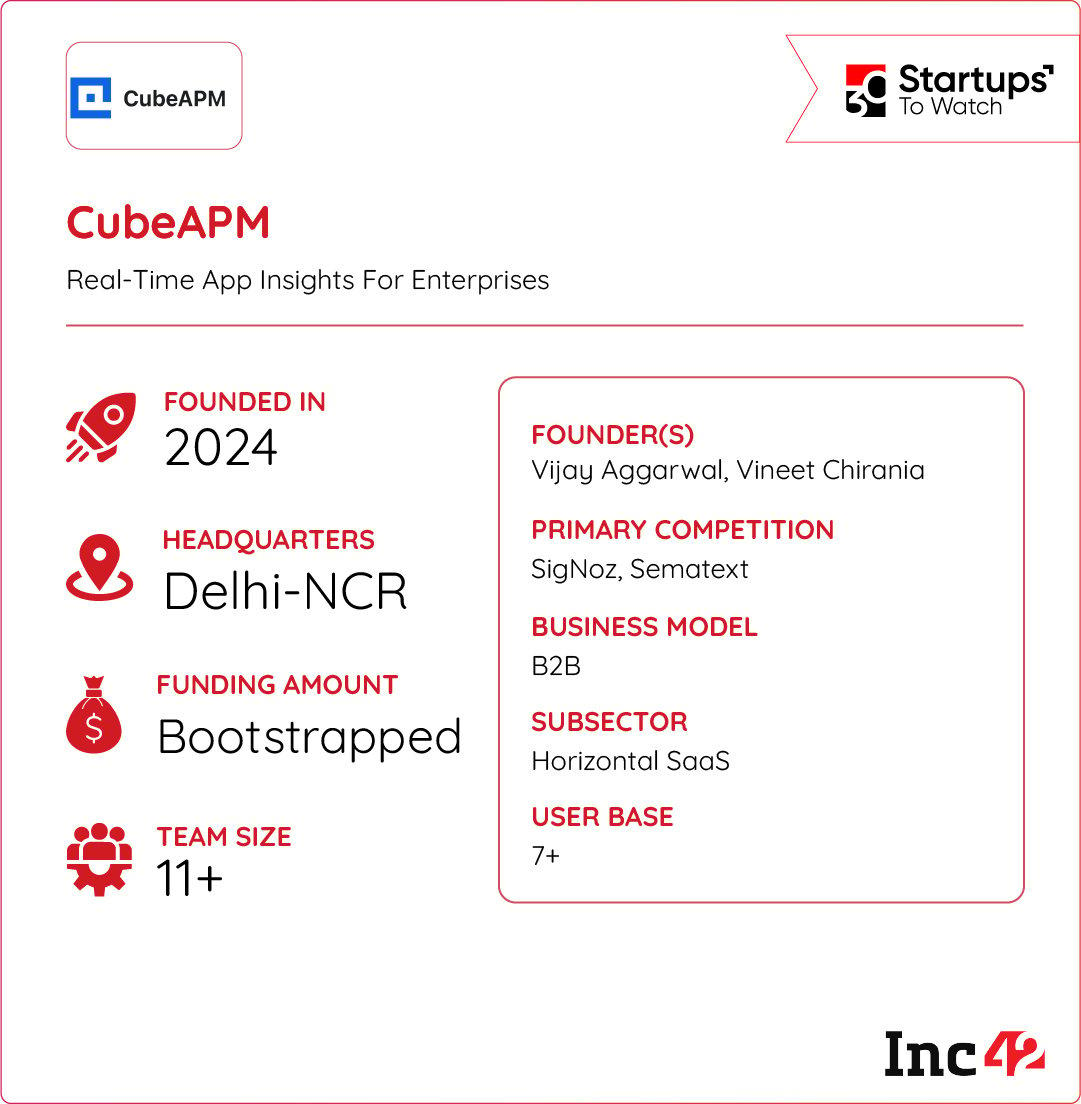
Modern apps built on microservices and cloud-native setups churn out massive performance data. Traditional application performance monitoring (APM) tools often fail to keep up, as they are slow, drive up infrastructure costs, and make it harder for developers to maintain peak performance.
CubeAPM, founded in 2023 by ex-BharatPe CTO Vijay Aggarwal and later joined by ex-Trainman cofounder Vineet Chirania, is rethinking APM for today’s developers.
Its platform automatically collects performance data across applications and IT systems, presenting it in a clean, searchable dashboard. With smart features like real-time alerts, service-level tracking (SLOs), and efficient data sampling, CubeAPM helps enterprise teams resolve issues before they impact users, without overloading resources.
By processing data on clients’ own systems, the company claims that its product delivers results 2X–4X faster while cutting costs by up to 80% compared to traditional APM solutions.
Working with enterprises like Delhivery, PB Fintech, Mamaearth and Practo, CubeAPM is seeing strong traction in the global APM market, which is set to breach the $21 Bn mark by 2032.
Cumin Co. | Reinventing Non-Stick Cookware
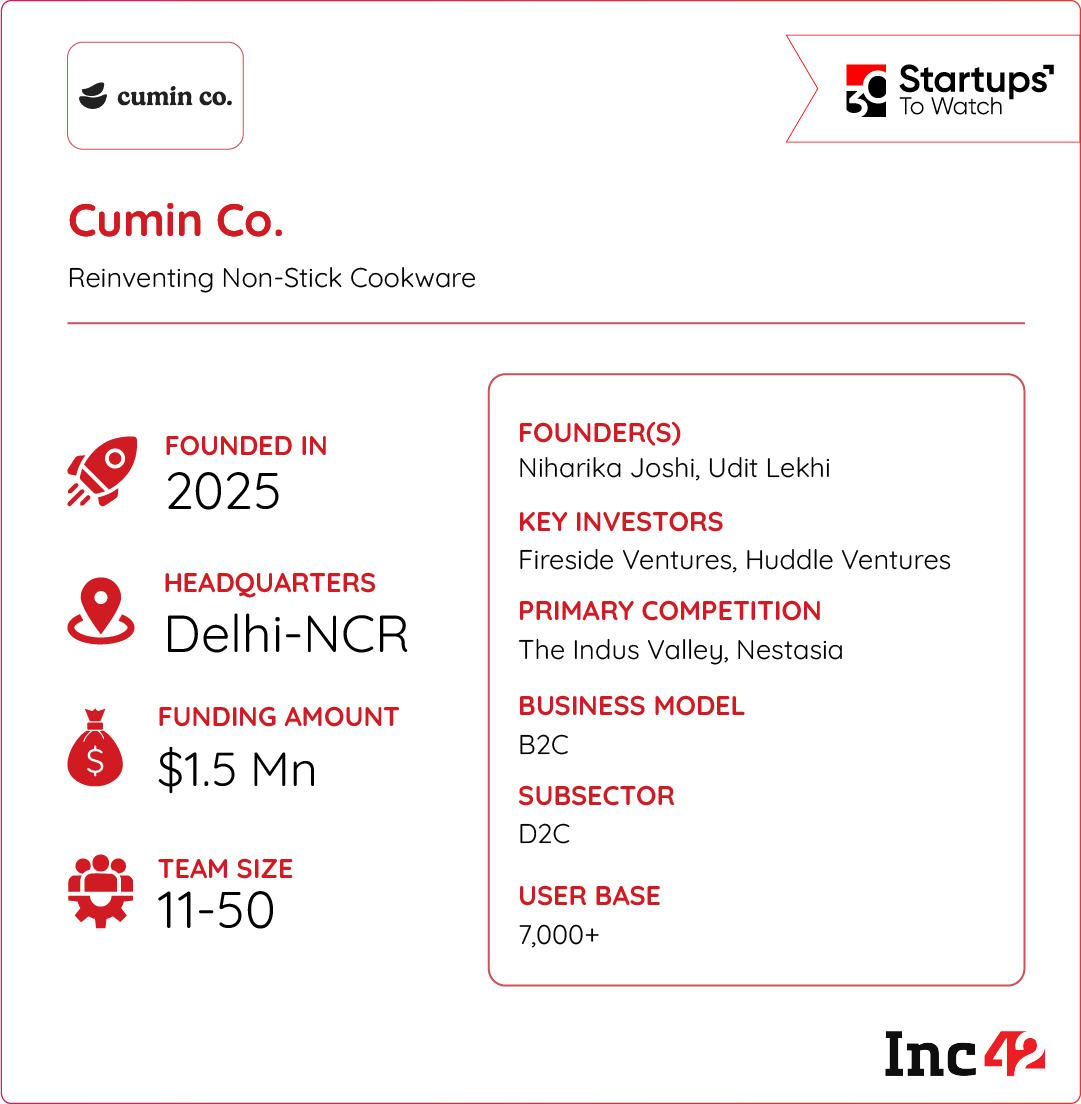
Traditional non-stick cookware is often coated with substances that could pose potential health risks. Though many consumers underplay these dangers, a growing number of Indians are actively seeking safer, longer-lasting and more stylish options for their kitchens.
Cumin Co., founded in 2024 by ex-Noise VP Niharika Joshi and ex-Mastercard director Udit Lekhi, offers toxin-free, enamel-coated cast iron cookware.
The idea was born after the founders discovered traces of aluminium from their cookware in their children’s meals. Determined to create a healthier alternative, they developed a range that combines safety, durability, and modern design.
Cumin Co. offers a range of core kitchen essentials, including Dutch ovens for slow cooking and baking, dosa and roti tawas, skillet and small pans, and traditional kadais.
Alongside these, the brand also provides kitchen accessories such as bakeware, bamboo organisers, chopping boards, and tools that promote healthier, organised cooking.
Dropon | Powering Green Last-Mile Deliveries
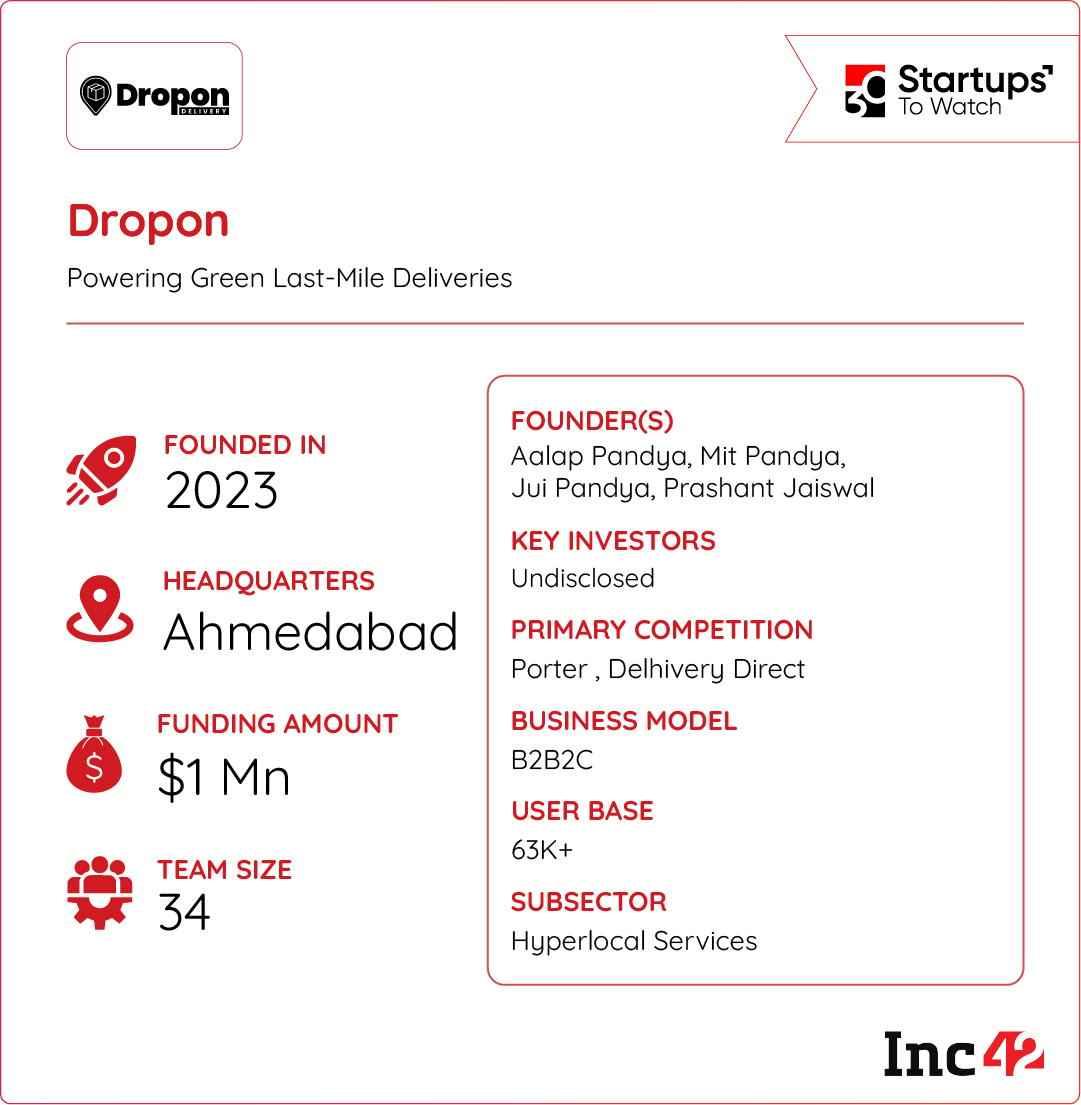
As electric vehicles (EVs) become more popular, businesses and consumers are looking for greener, cost-effective ways to manage deliveries. Traditional delivery fleets are expensive to run and contribute to pollution, leaving urban logistics in need of a sustainable solution.
Founded in 2023 by Ahmedabad-based techies Prashant Jaiswal, Aalap Pandya, Mit Pandya and Jui Pandya, Dropon offers on-demand hyperlocal deliveries powered entirely by EVs. The platform connects customers with delivery partners, Green Superheroes, who ensure fast, eco-friendly, and reliable deliveries.
From groceries and documents to ecommerce shipments, Dropon combines real-time tracking, secure payments, and efficient operations to make sustainable delivery practical and affordable. Since its launch, the startup has completed over 5,000 deliveries within Ahmedabad.
Dropon currently serves urban residents, small businesses, and enterprises in Ahmedabad but aims to tap into India’s growing hyperlocal delivery market.
With rising adoption of EVs and a push for sustainable logistics, there’s a clear gap for eco-friendly last-mile solutions in the logistics market dominated by players like Shadowfax and Evify.
Flash AI | Your AI Shopping Assistant
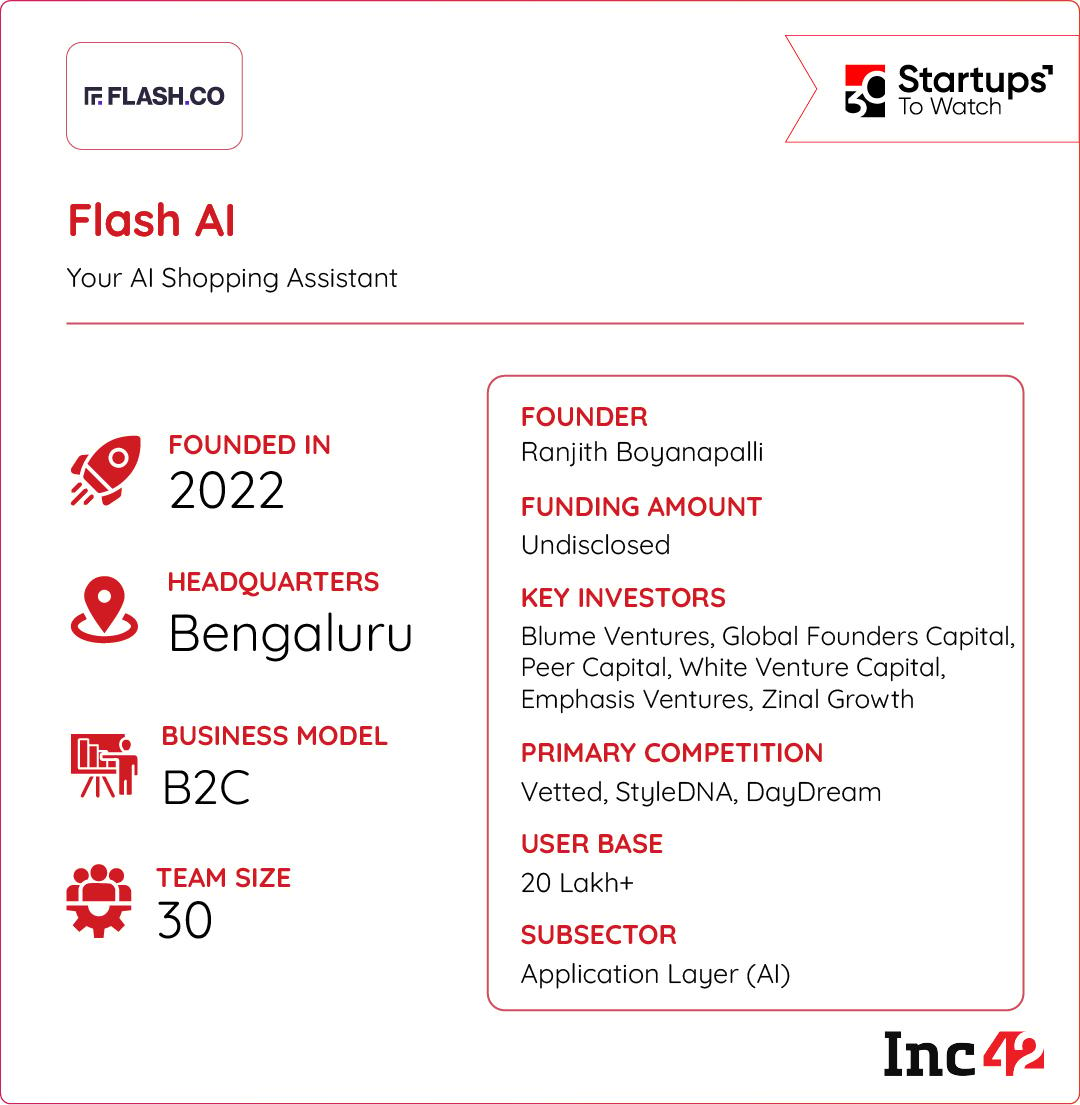
Online shopping offers endless choices, but too many options can overwhelm consumers. From reading product reviews on platforms to following YouTube influencers, shoppers often spend hours trying to determine whether a product is worth buying. The process is confusing, time-consuming, and prone to information overload.
Flash AI, founded in April 2022 by Flipkart VP Ranjith Boyanapalli, offers a smarter way to shop. The startup provides an AI-powered shopping assistant that help deliver instant, AI-generated insights to help consumers make informed decisions.
Users get detailed reviews, pros and cons, price comparisons, and purchase recommendations, all in one place. By integrating data from multiple ecommerce channels, Flash AI allows shoppers to cut through the noise.
Flash AI claims to cater to users across 100+ countries, tapping into a growing global ecommerce market hungry for tools that simplify the buying experience.
GydeXP | Building AI Guest Assistant For Hotels
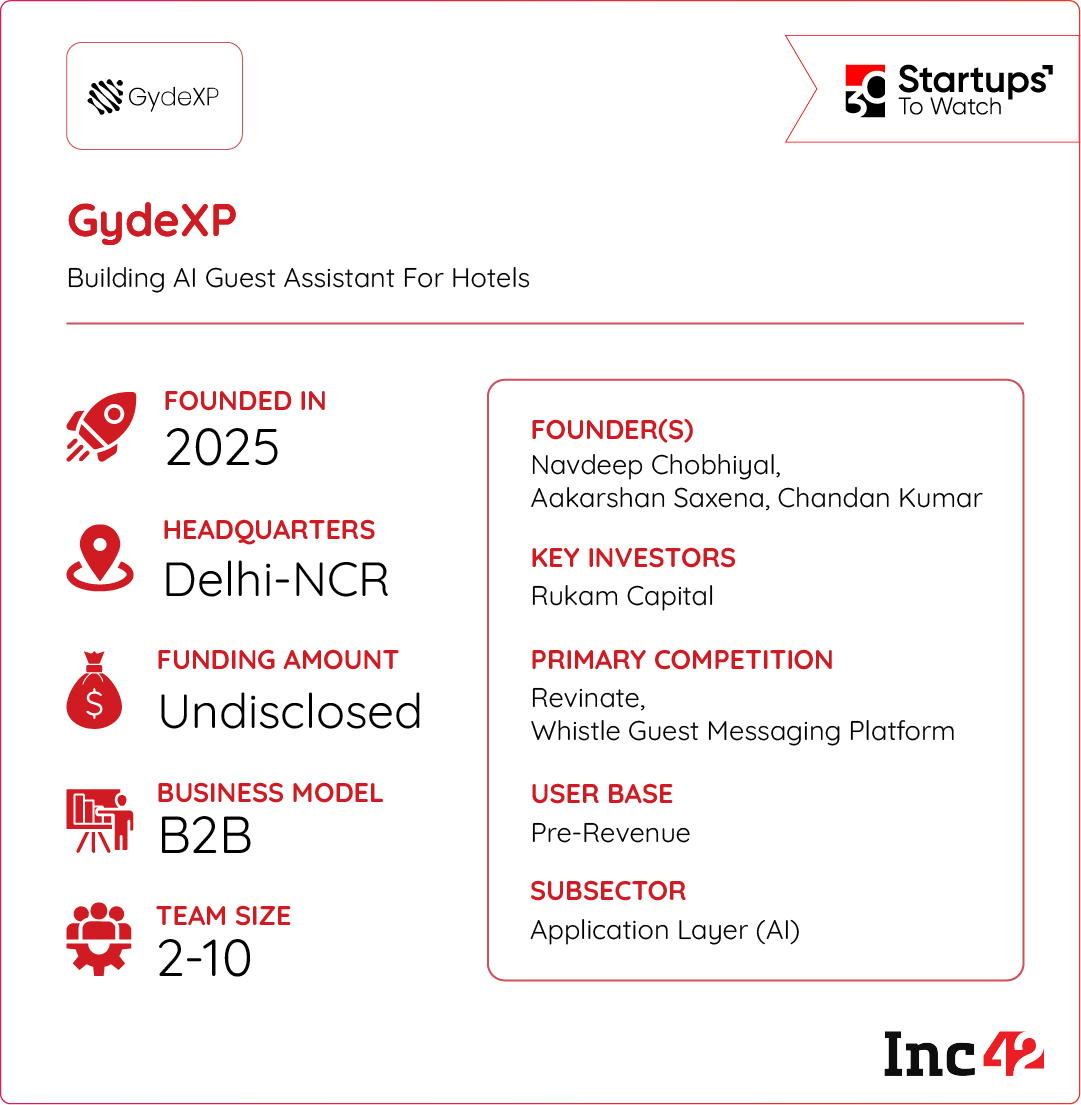
The hospitality industry often struggles with fragmented guest experiences, leading to missed upsell opportunities and inconsistent service quality. Hotels and short-term rentals face challenges in providing personalised guest interactions, impacting both guest satisfaction and operational efficiency.
IIT Delhi alumnus Aakarshan Saxena and his teammates witnessed first-hand the chaos that often consumes large events — unrelated service staff, delayed guest requests, miscommunications, and cultural mismatches, especially during huge gatherings.
It struck him that prevailing guest experience systems in hospitality felt impersonal and broken when scaled. The problem: hotels and retreats couldn’t deliver guest interactions that were responsive, culturally aware, or automated at scale.
Recognising the need for intelligent solutions in the hospitality sector, Saxena and his team developed their AI startup GydeXP in 2024.
The startup offers hospitality businesses an AI-powered platform named “Travel Studio” that integrates voice AI agents, multilingual support, and real-time task automation to provide seamless, personalised service from pre-arrival to post-checkout.
By transforming routine interactions into meaningful engagements, GydeXP enables hotels to increase revenue through upsells and improve operational efficiency, all while delivering culturally aware and contextually relevant service.
GydeXP targets hotels and short-term rental properties in India and Southeast Asia, focusing on establishments seeking to enhance guest experiences through technology.
iDO Devices | Building India’s Own Design-Led Electronics Ecosystem
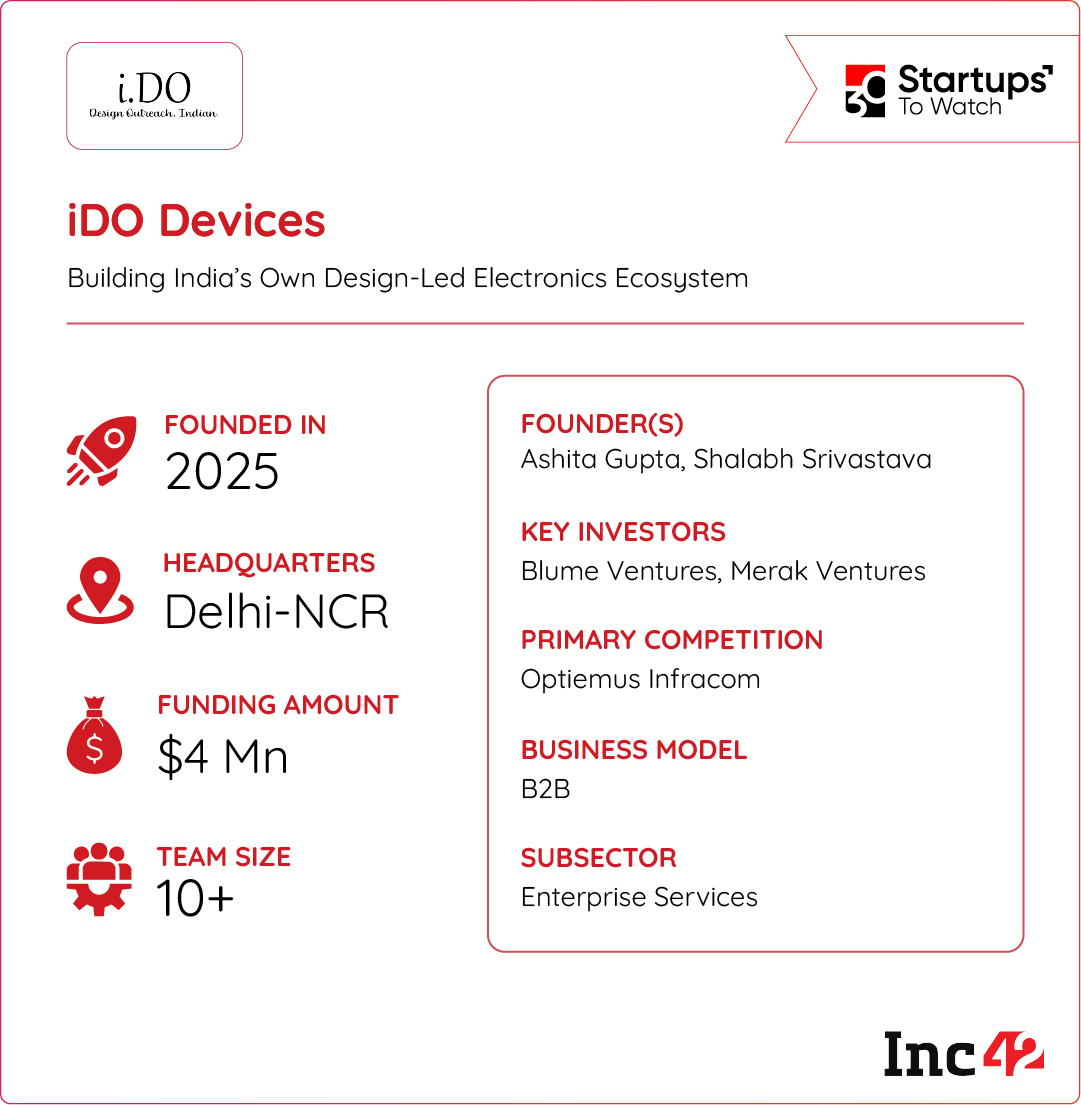
India’s push for tech manufacturing continues to be strained by the dearth of electronics-integrated design and production companies. This gap often forces homegrown electronics brands to heavily rely on global partners, particularly China.
Ashita Gupta and Shalabh Srivastava founded iDO Devices in 2023 to reverse this trend. Headquartered in Noida, the startup combines Indian design capabilities with an extensive original design manufacturing (ODM) ecosystem, empowering it to craft consumer tech products tailored to the specific needs of the customer.
The startup designs, develops, and delivers connected hardware products by leveraging its in-house design, firmware, mechanical, PCB, tooling, prototyping, and manufacturing capabilities.
Its offerings span hardware categories such as Bluetooth wearables, GSM-based phones, GPS-enabled trackers, and WiFi-powered smart devices.
With the domestic electronics market projected to cross the $400 Bn mark by 2030, iDO Devices is strategically poised to capture a significant chunk of this growth by offering a comprehensive, design-led manufacturing solution.
ILine | EV-Based Logistics For Tier II Cities
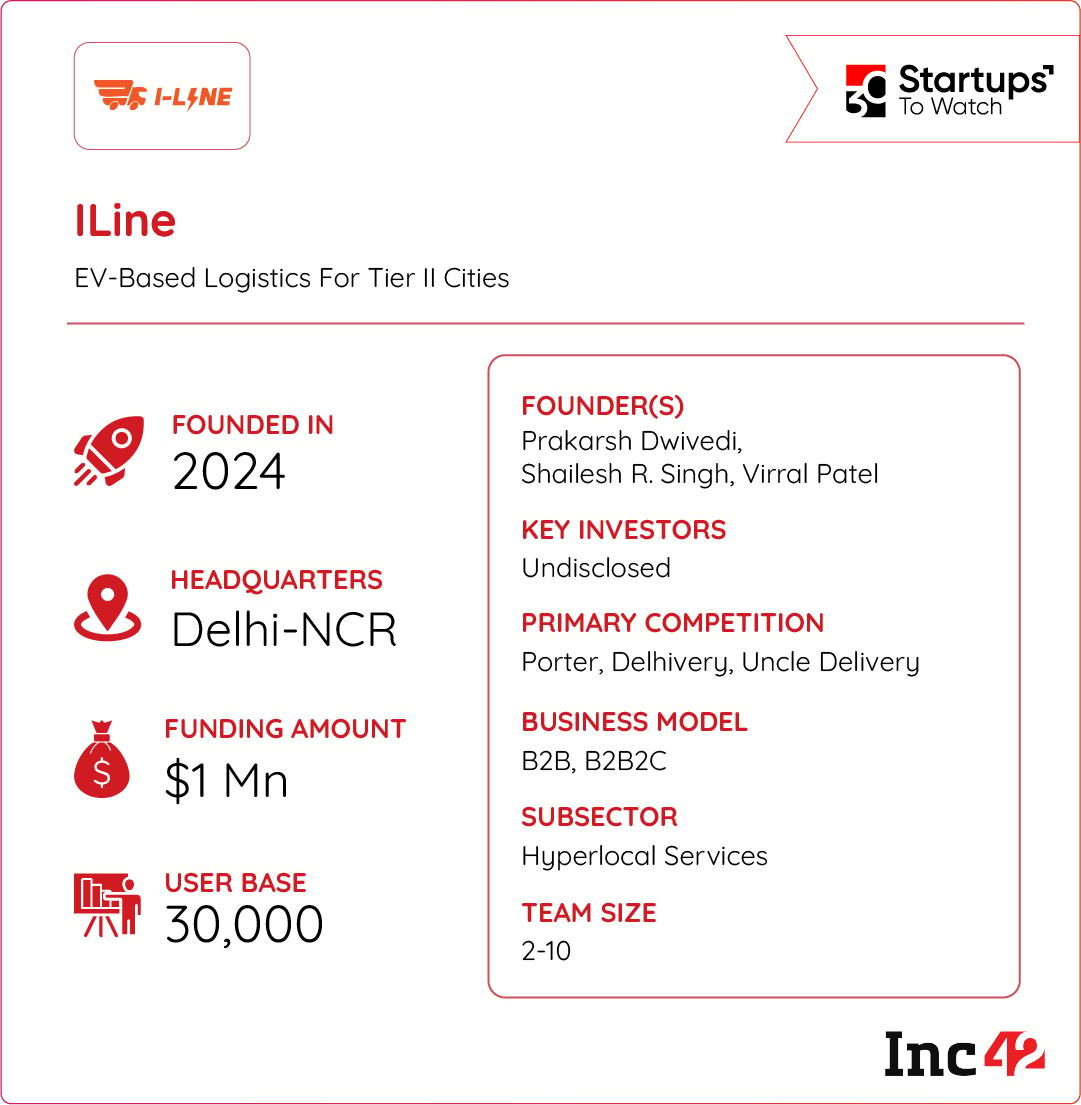
With the festive season just around the corner, Indian ecommerce and quick commerce platforms are readying for a surge in order volumes. However, the annual fiesta also brings to the fore a critical gap – the lack of sustainable last-mile logistics.
This gap drives up logistics costs and hampers ESG goals.
Recognising this critical market gap, Prakarsh Dwivedi, Shailesh Singh, and Virral Patel launched ILine in July 2024. The startup was born from the founders’ shared conviction that India’s logistics backbone desperately needed a sustainable, tech-driven overhaul.
ILine is a last-mile delivery logistics platform for businesses (ecommerce, brands, shippers) and a driver marketplace.
For drivers, its core technology is an AI-powered dispatch engine that ensures optimal route planning, minimises vehicle idle time, and guarantees secure drop-offs.
Through this marketplace model, ILine connects ecommerce brands, FMCG companies, and other large shippers with a diverse fleet of two, three and four-wheeler EV drivers. This approach delivers both cost-efficiency and low-emission delivery at scale.
Currently operational in Delhi NCR and Jaipur, ILine plans to expand into 12 Tier II cities by the end of 2025. Competing with Porter and Delhivery, it is betting on India’s fast-growing $3.5 Bn last-mile delivery market and the government’s push towards EV adoption to carve its niche.
Inamo | Helping Retailers Set Up Dark Stores
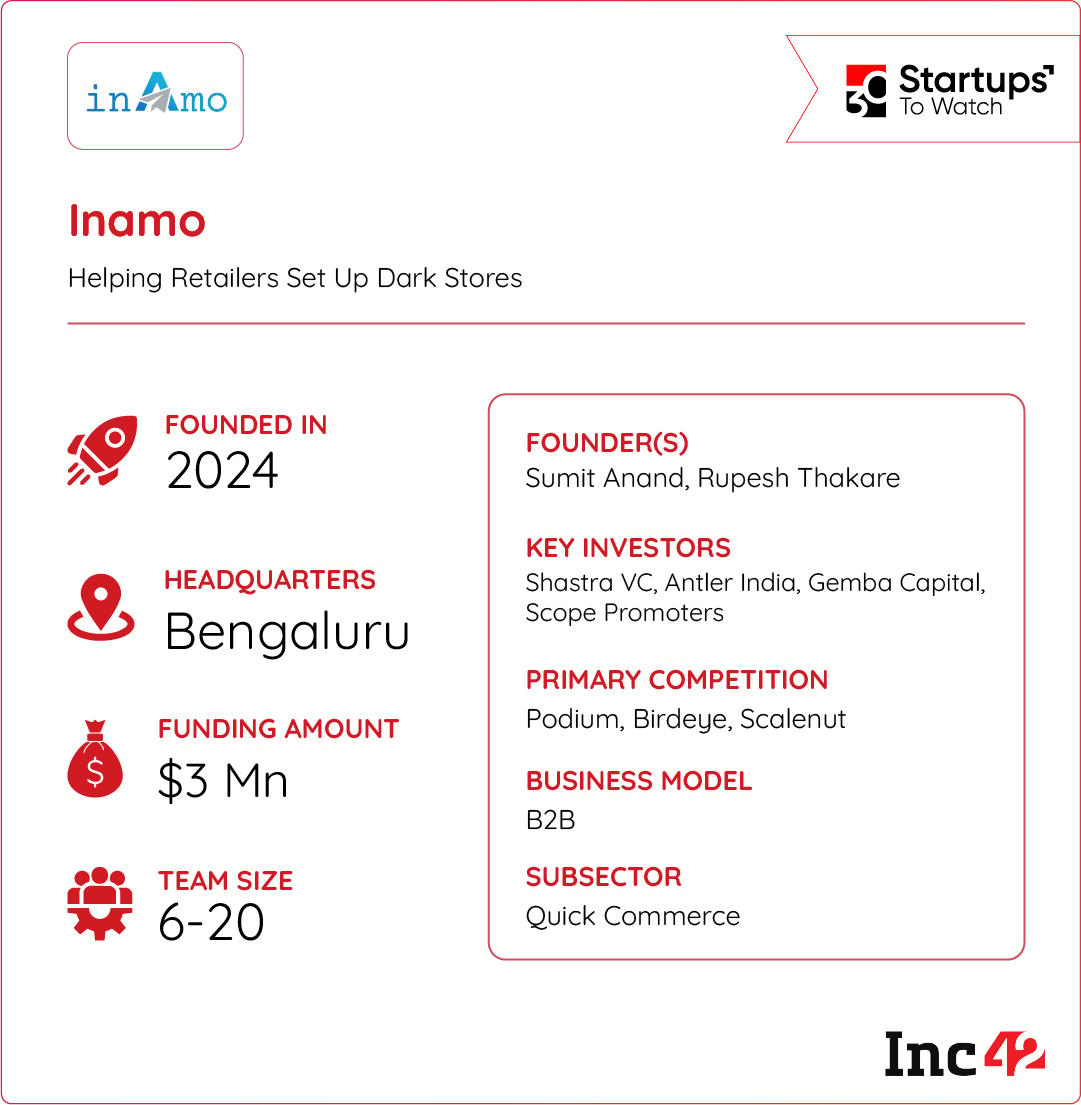
Founded by former Dunzo VP Sumit Anand and ex-ApnaKlub product head Rupesh Thakare in 2024, Inamo enables businesses to efficiently set up, scale, and optimise their dark store networks.
Inamo offers a full-stack solution that covers everything from dark store management software to last-mile delivery fleets and essential operational services.
The company generates revenue by charging for these outsourced services, licensing technology, and overall delivery optimisation.
Inamo targets quick commerce platforms, major grocery and FMCG brands, and retailers that require robust local fulfilment infrastructure. The startup has already demonstrated rapid scale in metro cities, currently operating and enabling over 50 dark stores with a dedicated last-mile fleet across six major metros.
Inamo’s focus on quick commerce enablement is strategically timed. The Indian quick commerce space is poised to expand from $6.1 Bn in 2024 to $40 Bn by 2030. This translates to a 37% CAGR, which is a massive opportunity for operational partners like Inamo.
span {
margin: 0;
padding: 3px 8px !important;
font-size: 10px !important;
line-height: 20px !important;
border-radius: 4px !important;
font-weight: 400 !important;
font-style: normal;
font-family: noto sans, sans-serif;
color: #fff;
letter-spacing: 0 !important;
}
.code-block.code-block-55 .tagged {
margin: -4px 0 1px;
padding: 0;
line-height: normal;
}
@media only screen and (max-width: 767px){
.code-block.code-block-55 {
padding:20px 10px;
}
.code-block.code-block-55 .recomended-title {
font-size: 16px;
line-height: 20px;
margin-bottom: 10px;
}
.code-block.code-block-55 .card-content {
padding: 10px !important;
}
.code-block.code-block-55 {
border-radius: 12px;
padding-bottom: 0;
}
.large-4.medium-4.small-6.column {
padding: 3px;
}
.code-block.code-block-55 .card-wrapper.common-card figure img {
width: 100%;
min-height: 120px !important;
max-height: 120px !important;
object-fit: cover;
}
.code-block.code-block-55 .card-wrapper .taxonomy-wrap .post-category {
padding: 0px 5px !important;
font-size: 8px !important;
height: auto !important;
line-height:15px;
}
.single .code-block.code-block-55 .entry-title.recommended-block-head a {
font-size: 10px !important;
line-height: 12px !important;
}
.code-block.code-block-55 .card-wrapper.common-card .meta-wrapper .meta .author a, .card-wrapper.common-card .meta-wrapper span {
font-size: 8px;
}
.code-block.code-block-55 .row.recomended-slider {
overflow-x: auto;
flex-wrap: nowrap;
padding-bottom: 20px
}
.code-block.code-block-55 .type-post .card-wrapper .card-content .entry-title.recommended-block-head {
line-height: 14px !important;
margin: 5px 0 10px !important;
}
.code-block.code-block-55 .card-wrapper.common-card .meta-wrapper span {
font-size: 6px;
margin: 0;
}
.code-block.code-block-55 .large-4.medium-4.small-6.column {
max-width: 48%;
}
.code-block.code-block-55 .sponsor-tag-v2>span {
padding: 2px 5px !important;
font-size: 8px !important;
font-weight: 400;
border-radius: 4px;
font-weight: 400;
font-style: normal;
font-family: noto sans, sans-serif;
color: #fff;
letter-spacing: 0;
height: auto !important;
}
.code-block.code-block-55 .tagged {
margin: 0 0 -4px;
line-height: 22px;
padding: 0;
}
.code-block.code-block-55 a.sponsor-tag-v2 {
margin: 0;
}
}
]]]]>]]>
Indian Snack House | Taking Desi Munchies Mainstream
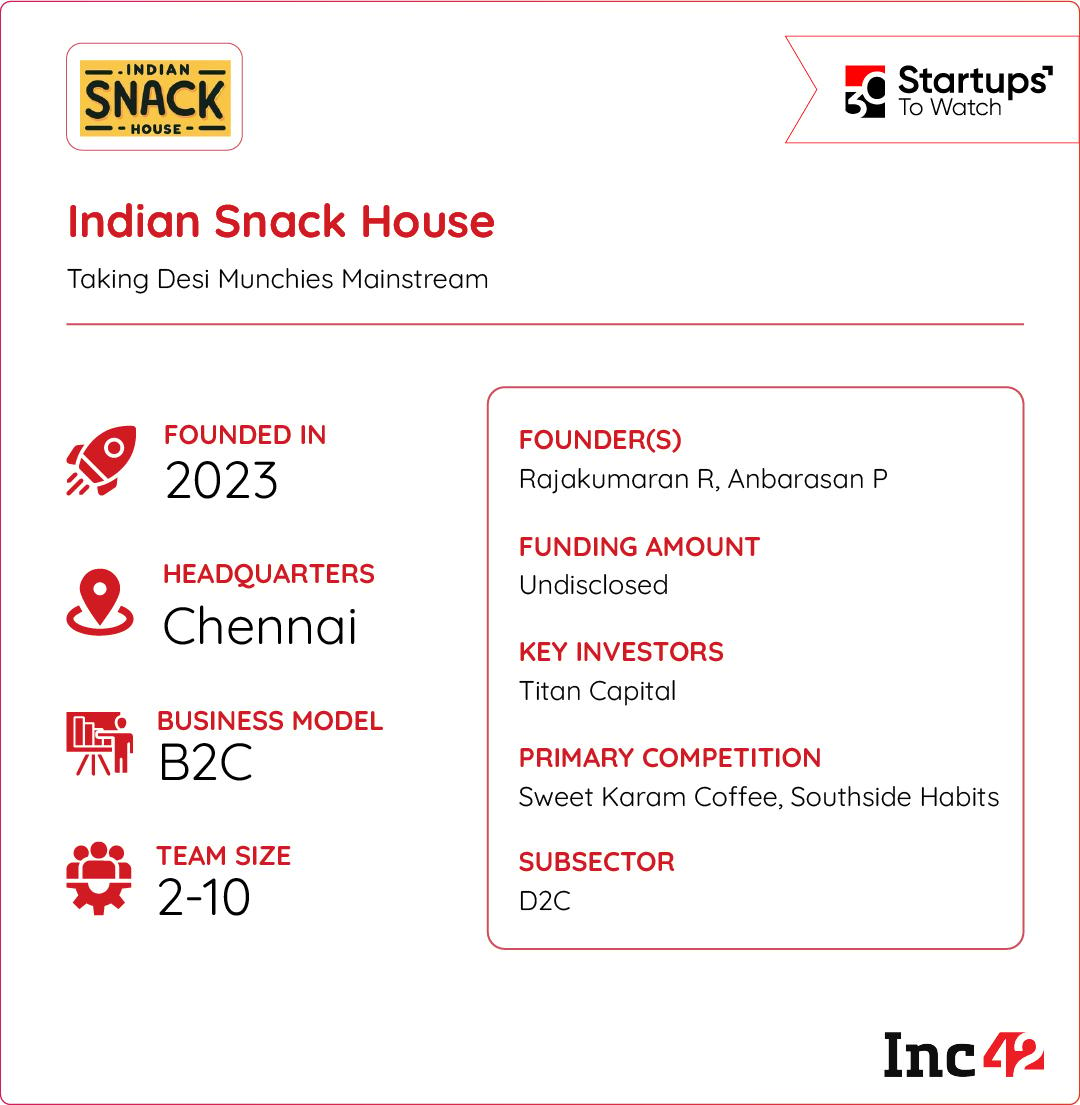
Many authentic regional snack makers across India are trapped by fragmented distribution, which prevents them from accessing a nationwide consumer base. As a result, consumers seeking genuine regional flavours often settle for mass-produced alternatives infused with palm oil and artificial preservatives.
Realising that there was a huge unmet demand for a trusted, clean-label D2C platform dedicated to native snacks, ex-ShopUp executive Rajakumaran R and Anbarasan Siva founded Indian Snack House in 2023.
The startup delivers authentic South Indian sweets and savoury snacks across the country via its D2C platform. It claims that all its products are sourced from regional artisans and free from palm oil, preservatives and artificial additives.
The brand offers rapid, same-day delivery in major metros like Chennai, Bengaluru, and Mumbai, alongside wider shipping across India.
Indian Snack House is positioning itself to capture the India savoury snacks market, which is expected to grow at a CAGR of 6.03% from $253.21 Bn in 2025 to $339.33 Bn in 2030.
Inferigence Quotient | Advanced Navigation System For Robots
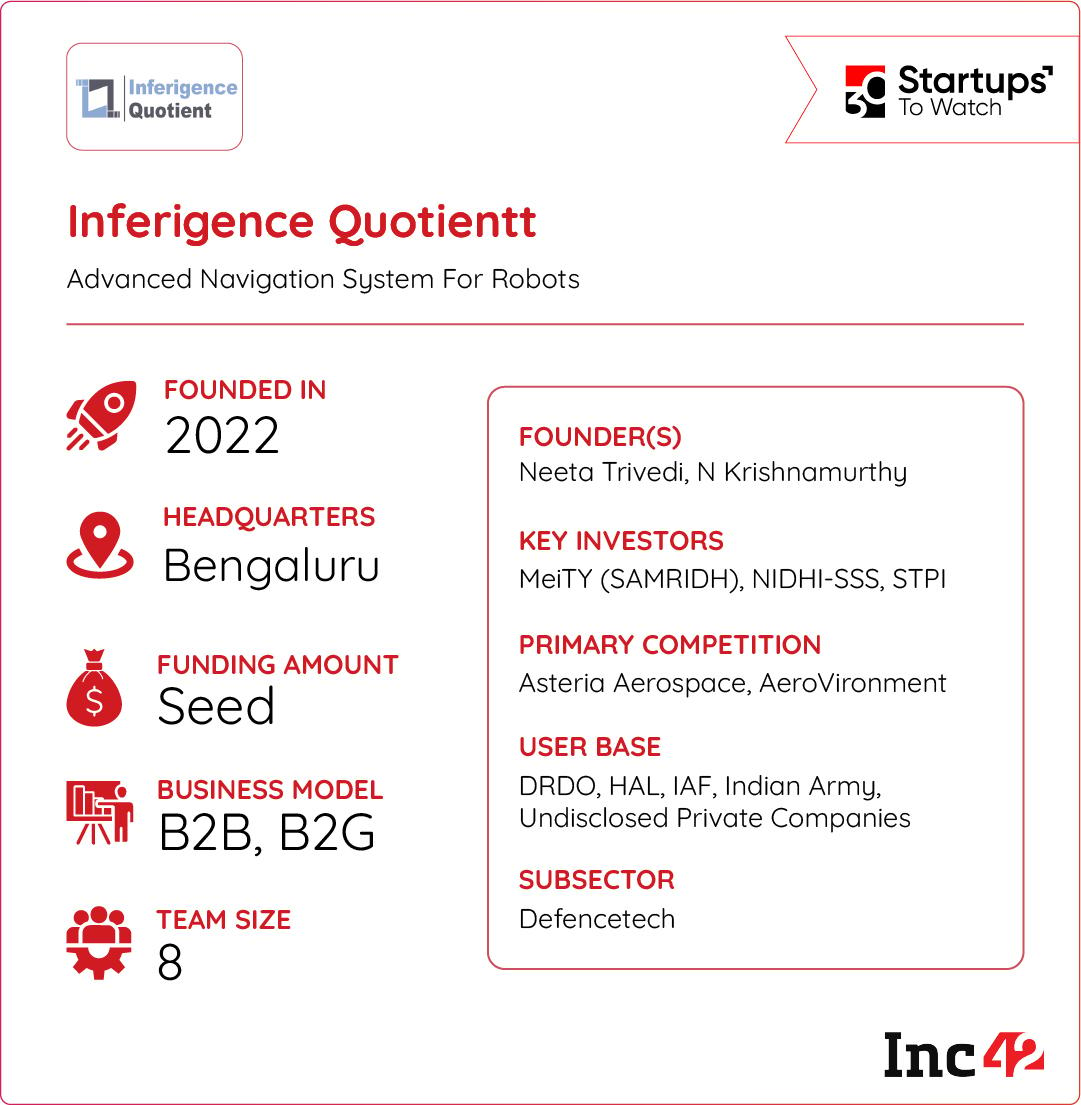
Autonomous technology, such as drones, robots, and surveillance systems, often struggles to function effectively in challenging environments with poor infrastructure or heavy conflict, making them unsafe for critical missions like defence surveillance.
To solve this, former DRDO aeronautical development scientist Neeta Trivedi founded Inferigence Quotient in 2022.
The Bengaluru-based startup is building advanced navigation and sensing AI software systems for military-grade drones, robotics, as well as intelligence, surveillance and reconnaissance (ISR) applications.
It is also developing detect-and-avoid systems, terrain-aided navigation, image/signal processing for surveillance, and hybrid navigation.
Besides defence agencies, the startup caters to civilian and other niche use cases. It is backed by the IT ministry’s Samridh platform, the science and technology department’s Nidhi seed scheme, and the Software Technology Parks of India (STPI).
Kustodian | Solving India’s Unclaimed Asset Problem
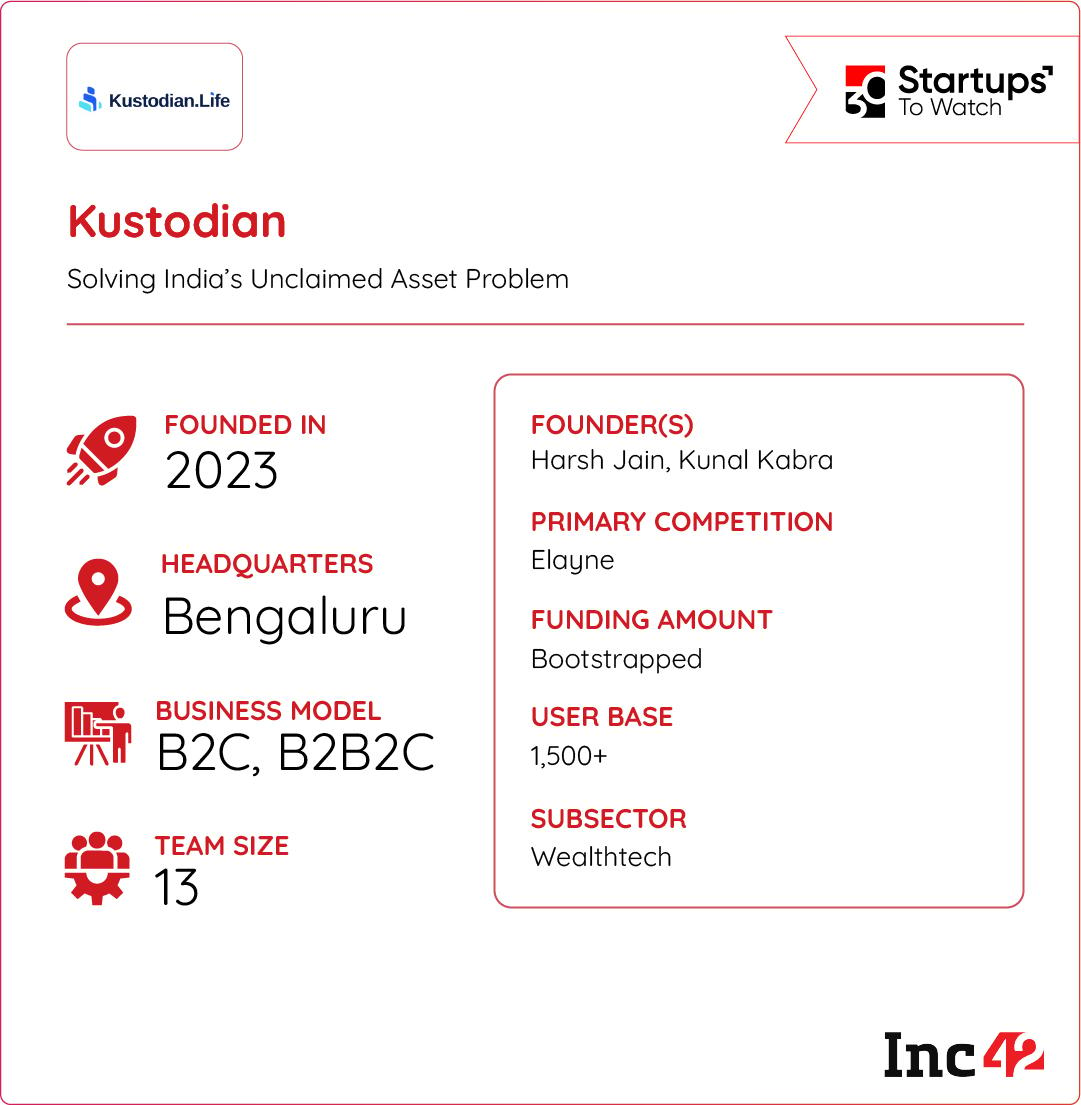
For families coping with the tragedy of losing a loved one, the subsequent financial and bureaucratic process becomes an unbearable second tragedy. The excruciatingly slow and complex bureaucracy often forces grieving individuals into a six-to-eight-month ordeal to retrieve money stuck across various financial instruments like EPF, bank deposits, and shares.
Witnessing these challenges firsthand, former William O’Neil software engineer Kunal Kabra joined forces with ISB alumnus Harsh Jain to address this systemic issue and founded Kustodian Life in 2022.
Kustodian’s platform leverages a unique combination of AI-driven workflows and human support to assist users with claim filings, necessary documentation, real-time tracking, and dispute resolutions. To provide holistic financial security, Kustodian also offers vital tools like will drafting and estate planning.
Kustodian operates on two business models – performance-based fee (charging only upon successful recovery) and flat-fee support for highly complex cases.
Over the past year, the fintech platform claims to have helped over 1,550 families within an average time period of 2.5 months, compared to a typical eight months or more.
At its core, Kustodian is tackling a part of India’s INR 2.5 Lakh Cr unclaimed asset problem, a number that is growing by more than INR 20,000 Cr annually.
Loopie | Redefining Parenting With Premium Baby Gear
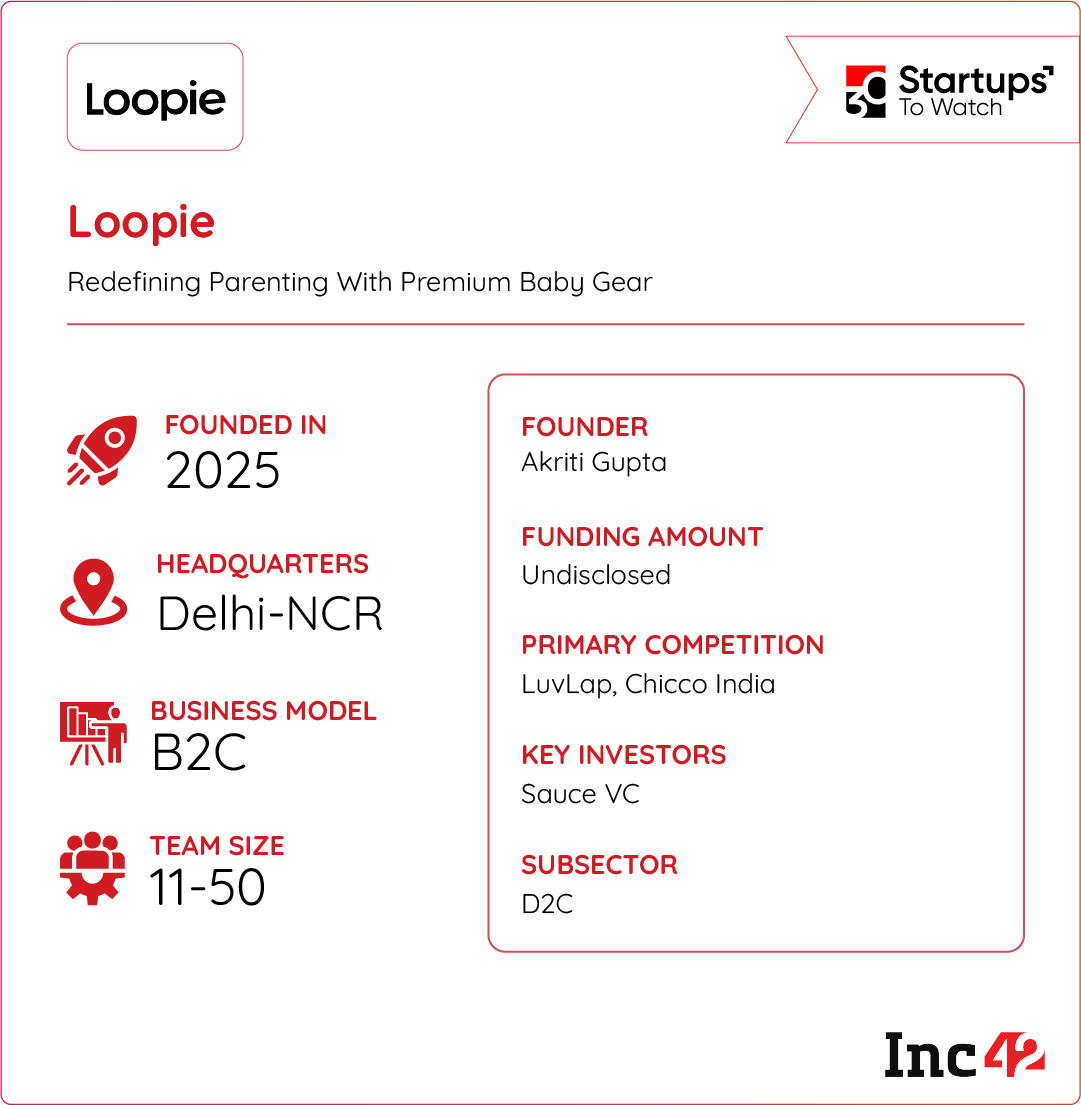
Indian parents often struggle to find premium baby gear that balances safety and comfort with style. Existing options either lack thoughtful design or are expensive imports that don’t cater to local needs.
Founded in 2024 by Akriti Gupta, Loopie was born out of a personal journey. Gupta identified a significant gap in the Indian market for well-designed, locally made baby products that cater to the unique needs of Indian parents and children.
It offers a range of thoughtfully designed baby gear, including strollers, car seats, diaper bags, and accessories.
Their flagship product, the Loopie Hop, is a lightweight, compact stroller designed for modern parents.
Loopie aims to carve a niche in the burgeoning Indian baby care segment, which is projected to become a $8.61 Bn market opportunity by 2030. By focusing on design and functionality, Loopie aims to build a trusted, homegrown alternative in a category historically dominated by giants like FirstCry and R for Rabbit.
Manam Chocolate | Crafting Indian Chocolates For The Global Palate
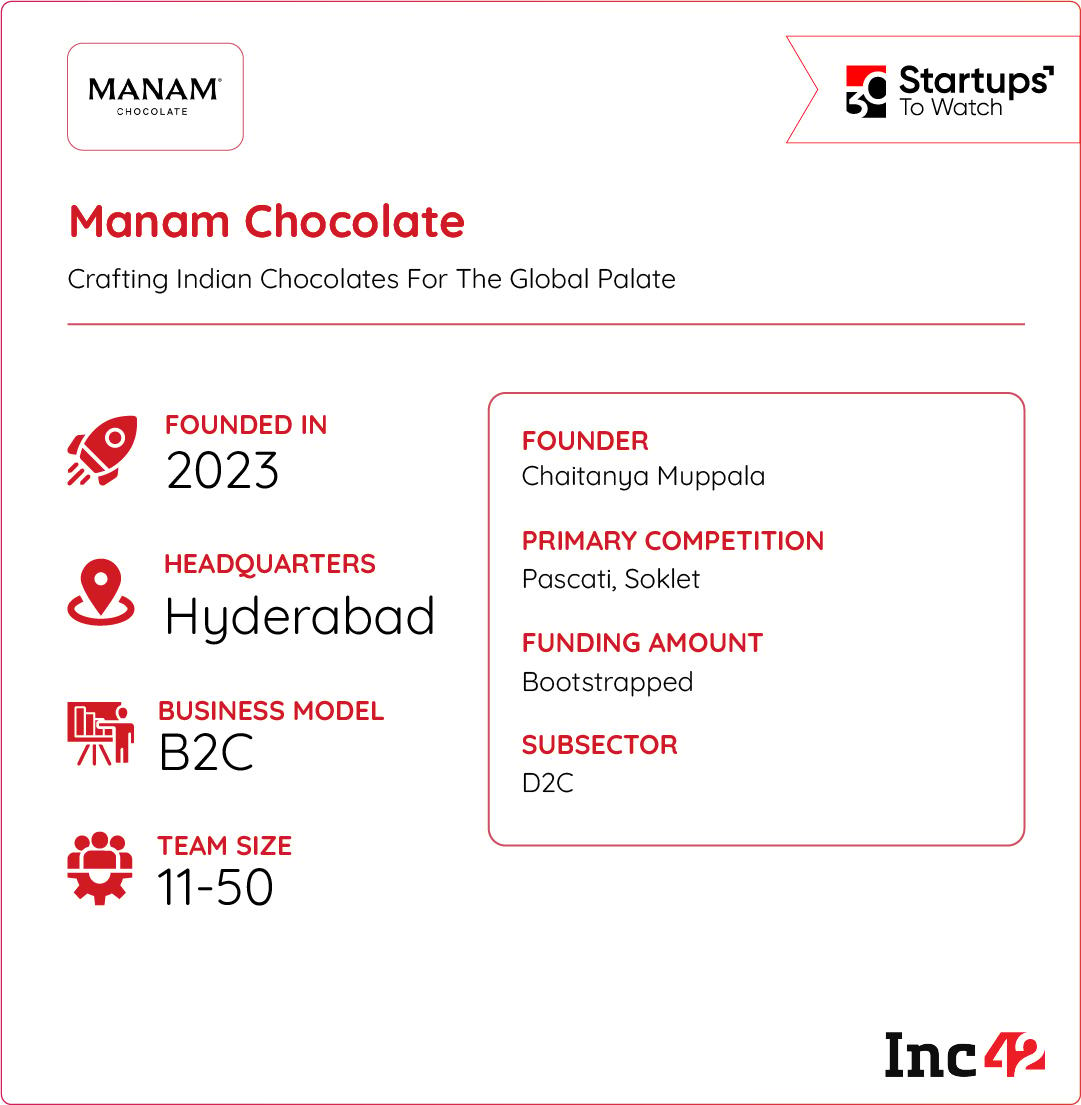
India’s rich cacao heritage has been ignored for years in the global fine chocolate market. Even within the country, imported brands overshadow the potential of homegrown cacao.
But Chaitanya Muppala, heir to Hyderabad’s famed bakery Almond House, is trying to change this narrative by putting Indian cacao on the global map.
Drawing on his family’s legacy and by collaborating directly with farmers in Andhra Pradesh’s West Godavari district, Muppala established Manam Chocolate to craft chocolates that authentically celebrate India’s unique flavours.
Founded in 2023, the D2C brand produces single-origin, bean-to-bar chocolates using Indian cacao. Their offerings include products like the Pistachio Fudge Inclusion Tablet and Chai Biscuit bars.
Their flagship store, the Manam Chocolate Karkhana located in Hyderabad’s Banjara Hills, serves as both a production facility and an immersive chocolate experience centre.
Nuyug | Jewellery For India’s Gen Z
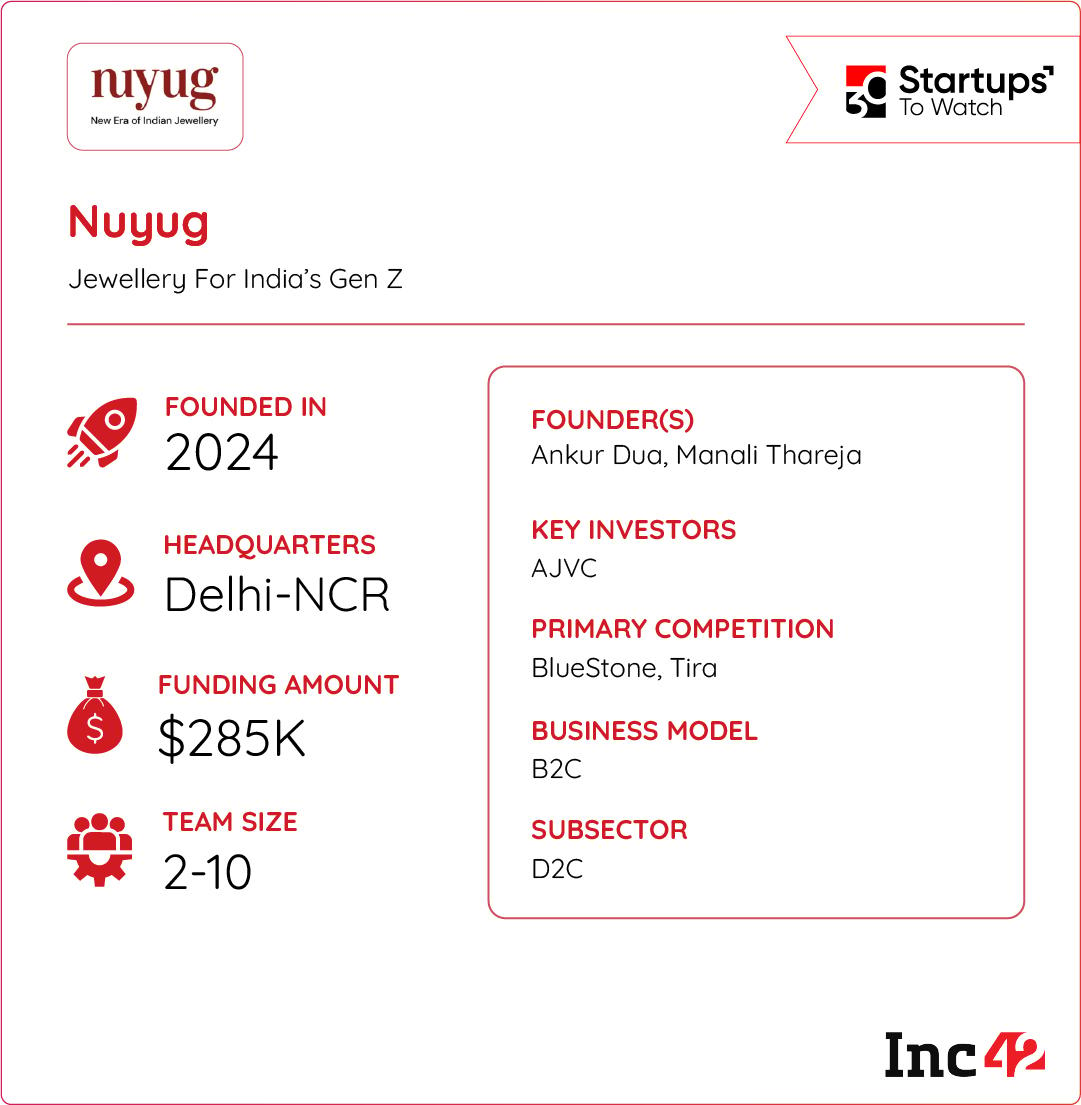
Founded in 2024 by Ankur Dua and Manali Thareja, Nuyug was born out of a desire to modernise Indian jewellery shopping. The founders noticed a rising demand among young consumers for trendy, lightweight and versatile pieces that could fit both daily and festive occasions.
Nuyug offers a wide variety of fashion jewellery, including earrings, necklaces, bracelets, and hair accessories. By blending traditional Indian styles with contemporary designs, their offerings centre around intricate, gold-plated, and embellished pieces suitable for festive, bridal, and everyday wear.
Positioning itself as a celebration-ready jewellery brand for India’s urban consumers, the D2C brand mainly operates online. It is also planning to go offline.
Targeting millennial and GenZ customers, Nuyug competes with both legacy jewellery brands like Kalyan Jewellers and Malabar Gold & Diamonds, as well as new-age tech companies like CaratLane and BlueStone.
It is currently focused on expanding its product range, enhancing its online presence, and scaling operations in the Indian jewellery market, which is projected to reach up to $130 Bn by 2030.
Paar Autonomy | Giving UAVs Human-Like Awareness
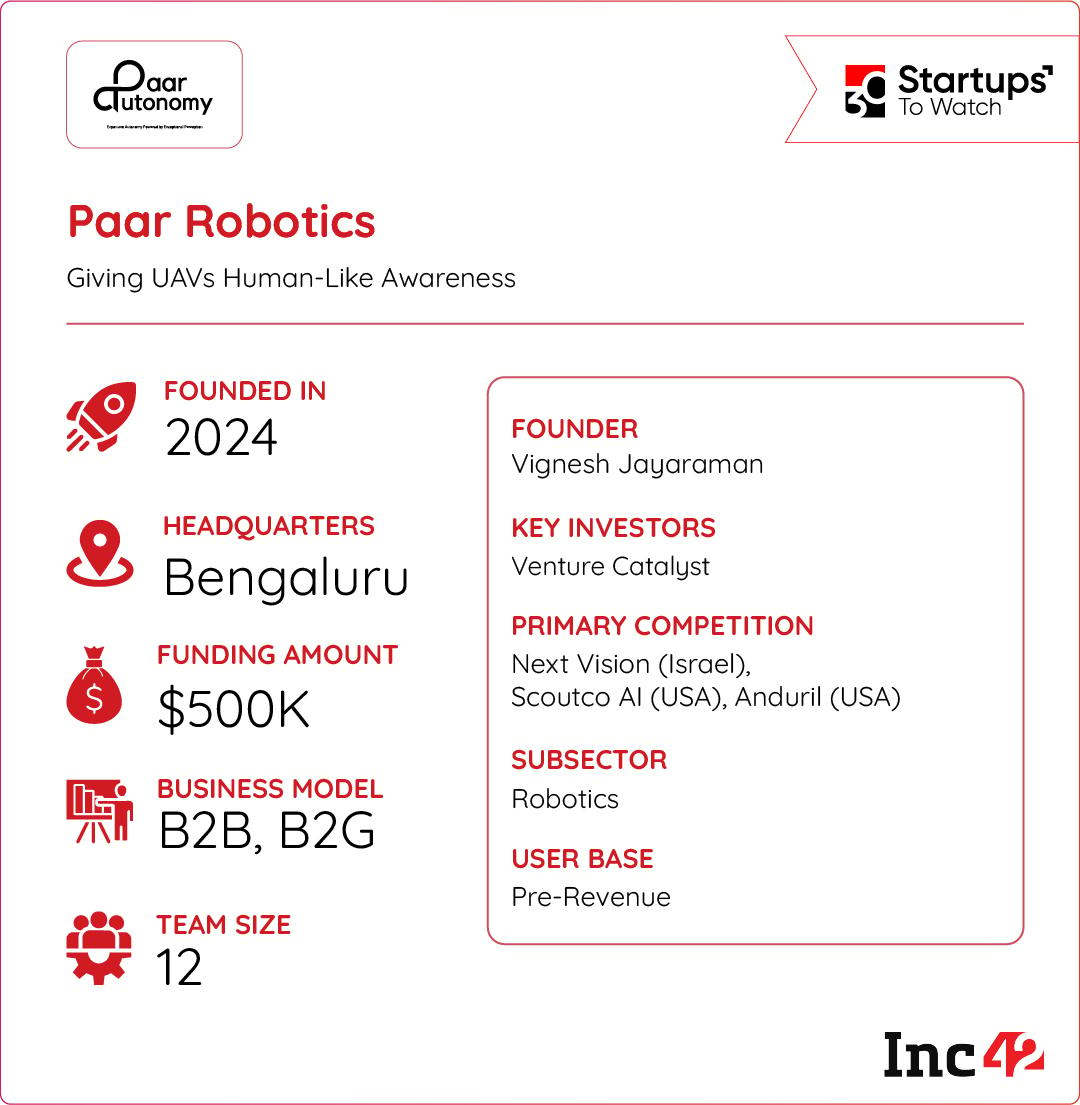
Unmanned vehicles are witnessing rapid adoption across sectors. Yet, the over-reliance of drones and rovers on single-sensor perception systems limits their operational capabilities, particularly in complex, real-world environments.
Traditional hardware often fails to provide the stable, comprehensive data required for true autonomy, creating a critical bottleneck in defence and industrial applications. To solve this, robotics engineer Vignesh Jayaraman founded Paar Autonomy in 2024.
Headquartered in Bengaluru, the Venture Catalysts-backed startup specialises in developing AI-powered, multi-sensor, gyro-stabilised gimbal cameras. These devices are then mounted on UAVs, helping them interact and interpret the complex environment around them, make decisions and coordinate with human operators.
Currently, the startup is focussed on delivering turnkey solutions to defence companies, public sector undertakings (PSUs), and original equipment manufacturers (OEMs) in the unmanned vehicle sector. With its novel offerings, the startup is eyeing a piece of the broader Indian defence tech market, projected to become a $19 Bn opportunity by 2030.
Pascal AI | Making Due-Diligence Easy
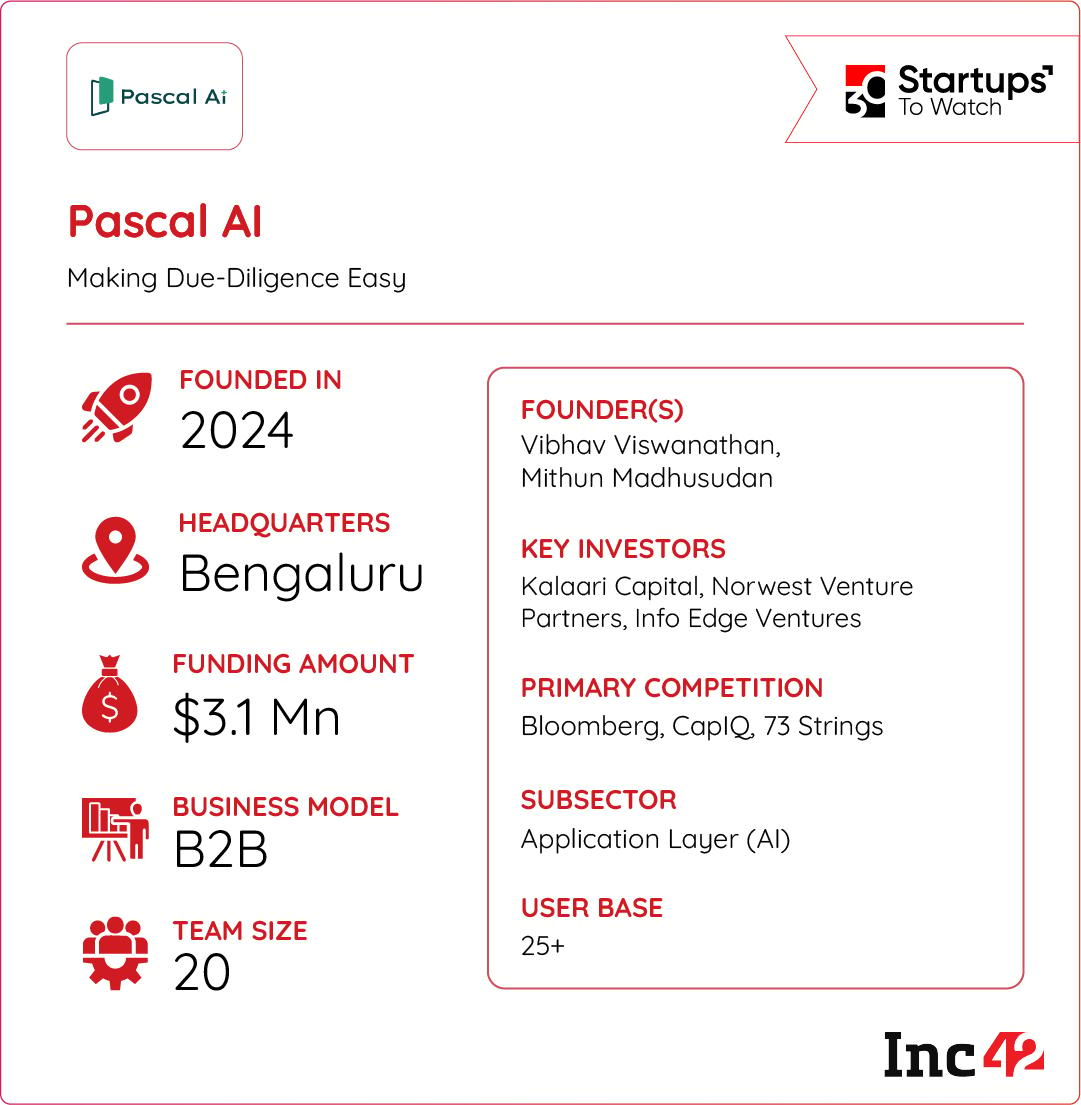
In the world of finance, big investment decisions carry billions of dollars of risk. As a result, investment professionals have to analyse an ever-increasing volume of fragmented, unstructured market data. This leads to analytical bottlenecks, human error, delays and a failure to spot crucial “red flags” buried deep within a company’s documents.
To automate this tedious task of due diligence, ex-Mobile Premier League CPO Vibhav Viswanathan and ex-Apna head of product Mithun Madhusudan founded their own agentic AI startup Pascal AI in 2024.
Pascal’s platform automates and accelerates financial research, deal diligence, data extraction, modelling, and insight generation.
It does this by using AI agents to analyse financial documents of companies to extract key performance indicators (KPIs) and detect “red flags”.
The startup claims to host data on more than 16,000 public companies across 27 markets, supporting enterprise-grade requirements such as on-premise deployment and role-based permissions. The startup claims that its platform is already deployed by more than 25 financial firms across the US and Asia Pacific (APAC).
PeakAmp | Turning EV Waste Into Value
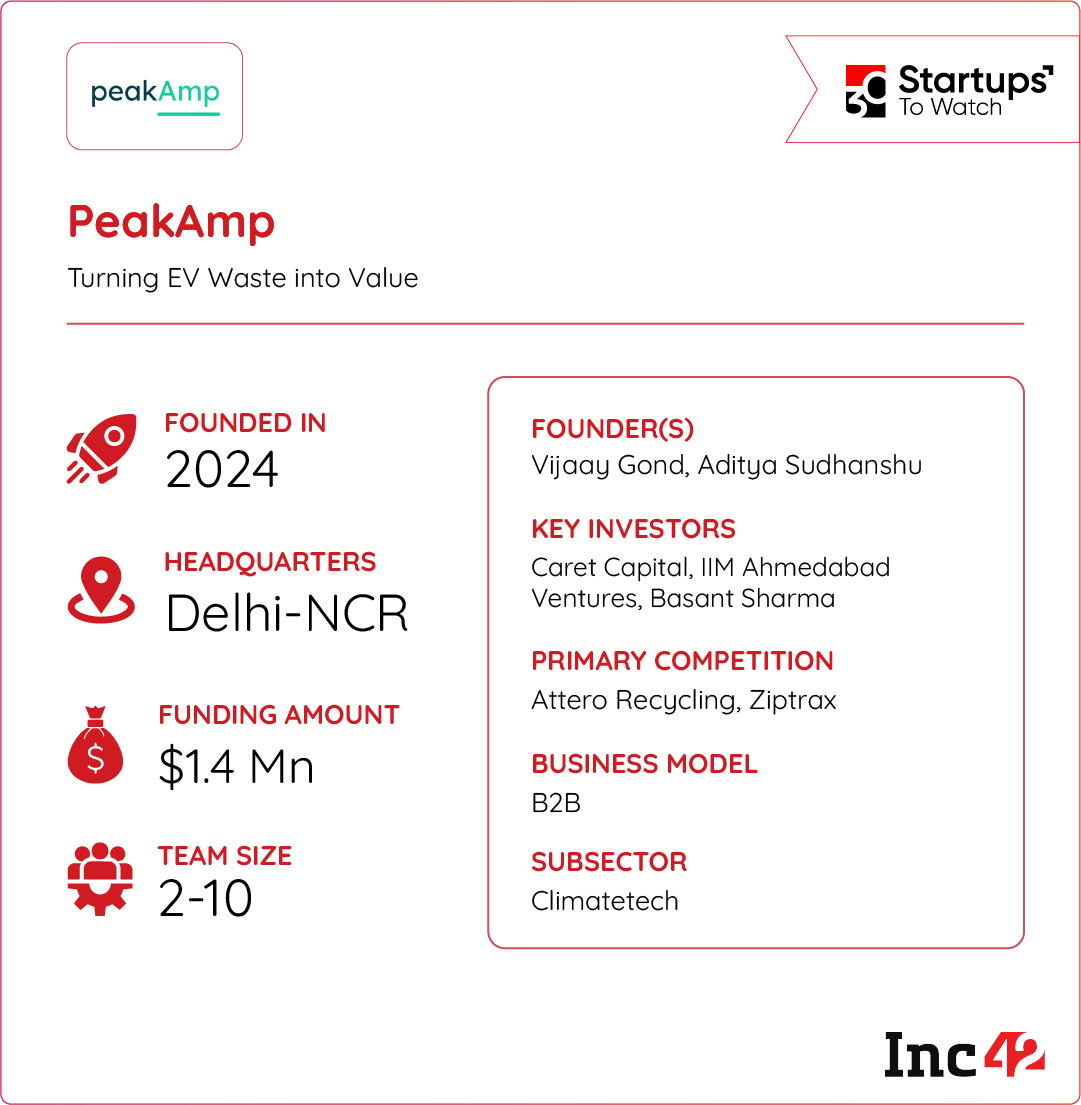
The rapid adoption of electric vehicles (EVs) in India is creating a looming environmental crisis – improper disposal of end-of-life lithium-ion batteries.
With a lack of recycling infrastructure, toxic battery waste is polluting our land and water, while India misses the chance to recover valuable materials like lithium, nickel, and copper, making the country dependent on imports.
To tackle this problem, ex-BatX Energies general manager Vijay Gond and BITS-Pilani alumnus Aditya Sudhanshu launched battery recycling startup PeakAmp in 2024.
Envisioned as a full-stack, tech-enabled battery circularity platform, peakAmp partners OEMs, recyclers and material suppliers to create a robust ecosystem that supports sustainable practices throughout the battery lifecycle process.
Its services include safe collection and reverse logistics from OEMs and recyclers, diagnostics and battery testing hubs, automated disassembly, high-purity material recovery, and second-life applications of used batteries. Besides, it integrates data-driven analytics to grade battery health.
With the Indian EV market projected to skyrocket to $132 Bn by 2030, peakAmp is strategically positioned to meet the urgent and massive demand for a scalable, efficient, and compliant solution for battery waste management.
Produktiv.ai | AI Governance Platform For Enterprises
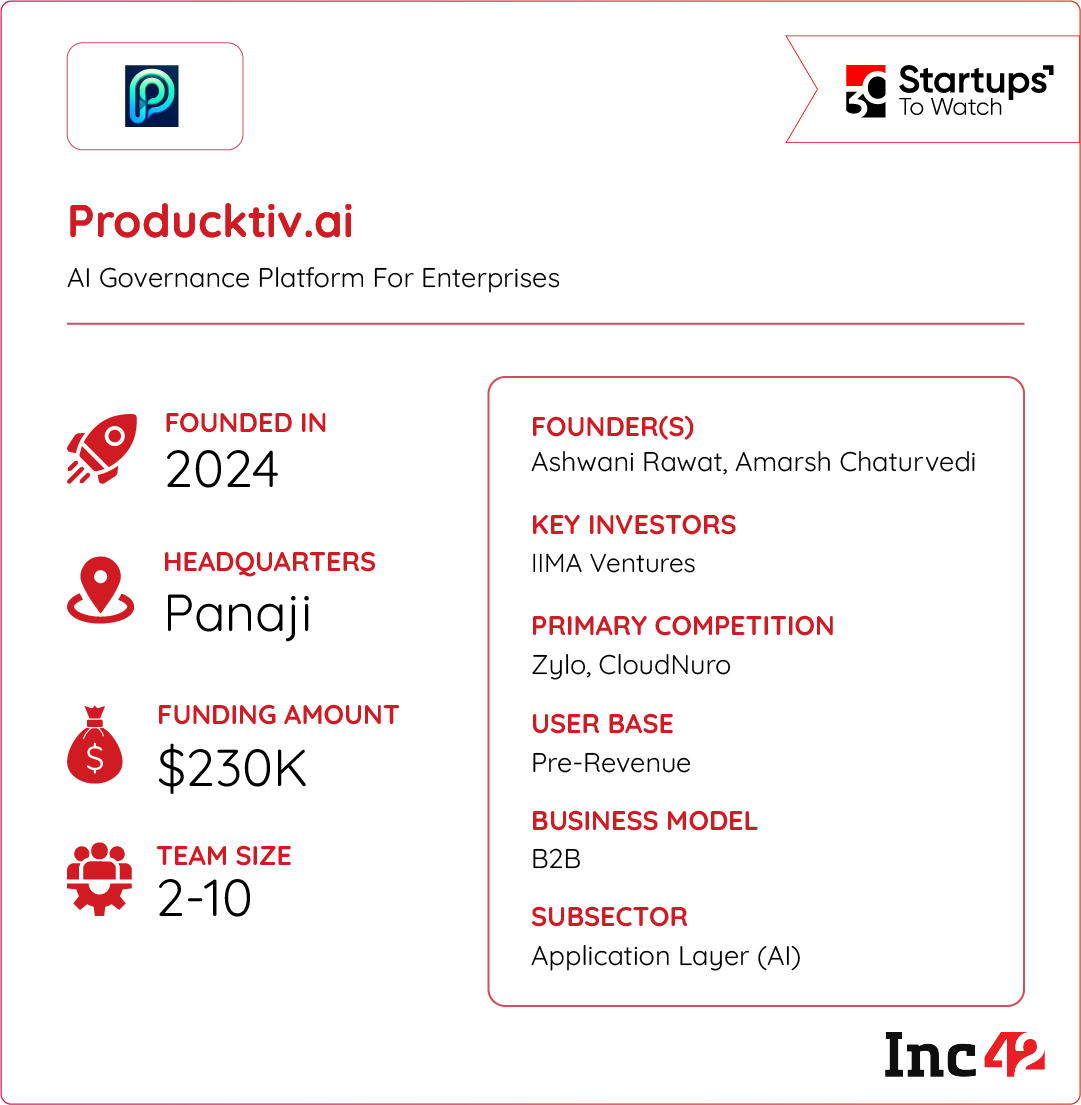
For large global enterprises, the race to adopt GenAI is fraught with challenges related to data governance and compliance. Without stringent controls, integrating AI solutions into core operations can pose risks to data security and create regulatory troubles.
To address this challenge, Ashwani Rawat and Amarsh Chaturvedi founded produktiv.ai in 2024. The startup allows enterprises to implement AI solutions across their operations, with complete control over data governance.
The platform is designed to help companies manage and monitor unstructured data at scale. Its multi-tier, configurable architecture integrates seamlessly with existing data stacks, including vector databases, enterprise identity providers, and large language models (LLMs) to implement AI solutions.
Set to launch soon, the platform’s core value lies in its comprehensive data control system, which categorises data sources and enforces strict adherence to regulatory standards in all AI-led data handling and decision-making.
Focussed on large enterprises globally, the Goa-based startup has so far raised $230K from IIMA Ventures, enabling early product development and customer engagement efforts.
Puch AI | Multilingual Voice-Based Assistant For India’s Hinterlands
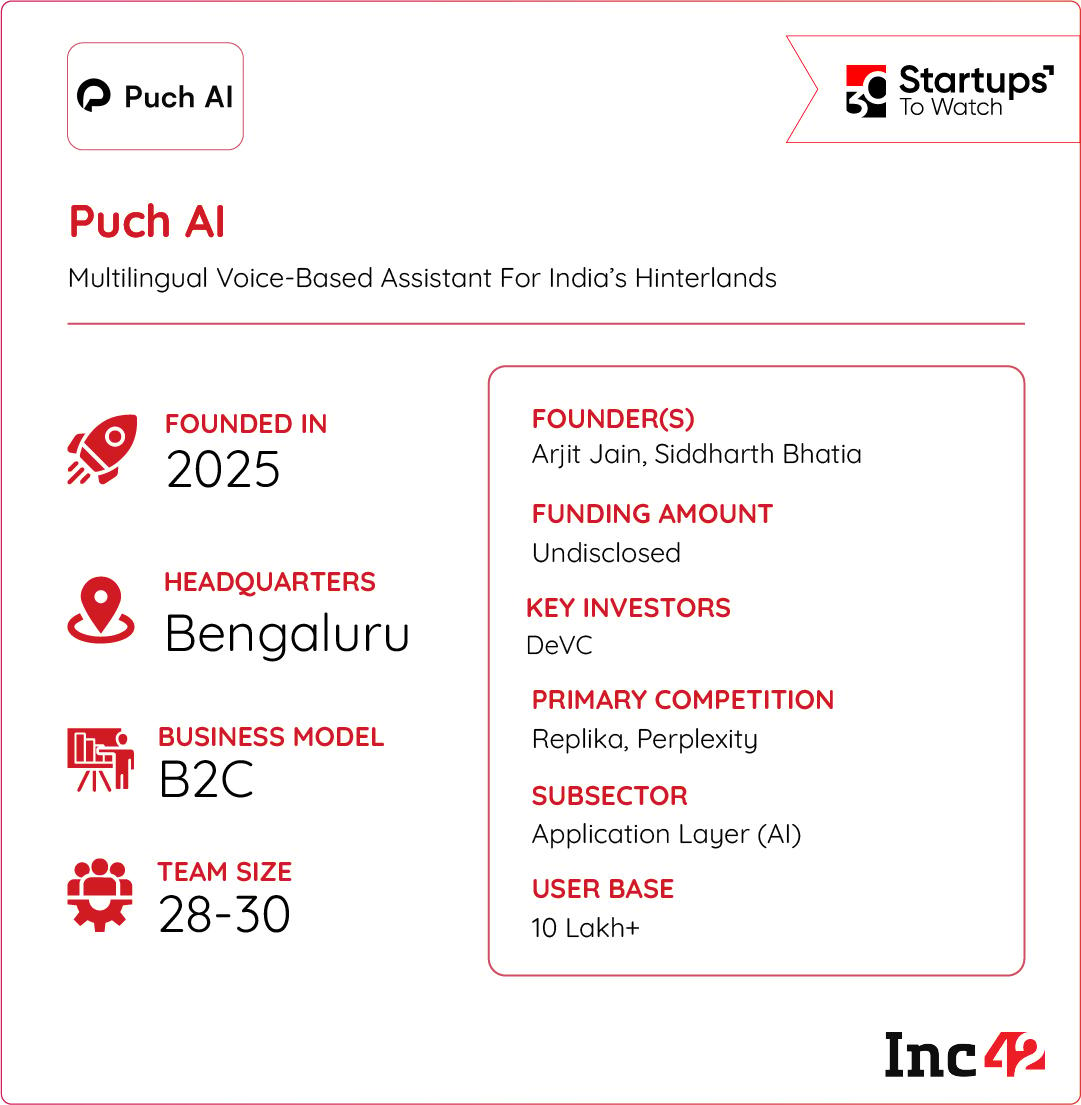
Indians are wholeheartedly embracing AI. Yet, the technology remains largely inaccessible to the majority of Indians, as most AI assistants are built exclusively for English-speaking, tech-savvy users.
This fundamental design flaw effectively excludes millions of people in the country’s heartland, who prefer to communicate in regional languages. Trying to fill this gap is Puch AI.
Founded in 2025 by Siddharth Bhatia and Arjit Jain, Puch is building a multilingual voice-based assistant that works directly on two of the most universal communication channels in India – WhatsApp and phone calls.
By focussing on voice-first interactions in 22 Indian languages and leveraging WhatsApp’s ubiquity, the startup’s chatbot can answer queries, perform real-time fact checks, and provide conversational support in multiple vernacular languages.
The platform runs on a proprietary LLM stack optimised for multilingual natural language processing (NLP), targeting both casual users and enterprises seeking customer-facing AI integrations.
Puch AI is going after India’s massive non-English-speaking internet user base, expected to cross 500 Mn by 2030. With WhatsApp penetration already exceeding 500 Mn users in India, the startup sits at the intersection of vernacular AI, conversational commerce, and information services, competing with Google Assistant and Jio AI.
QuantE Energy | The Green Push For India’s Housing Societies
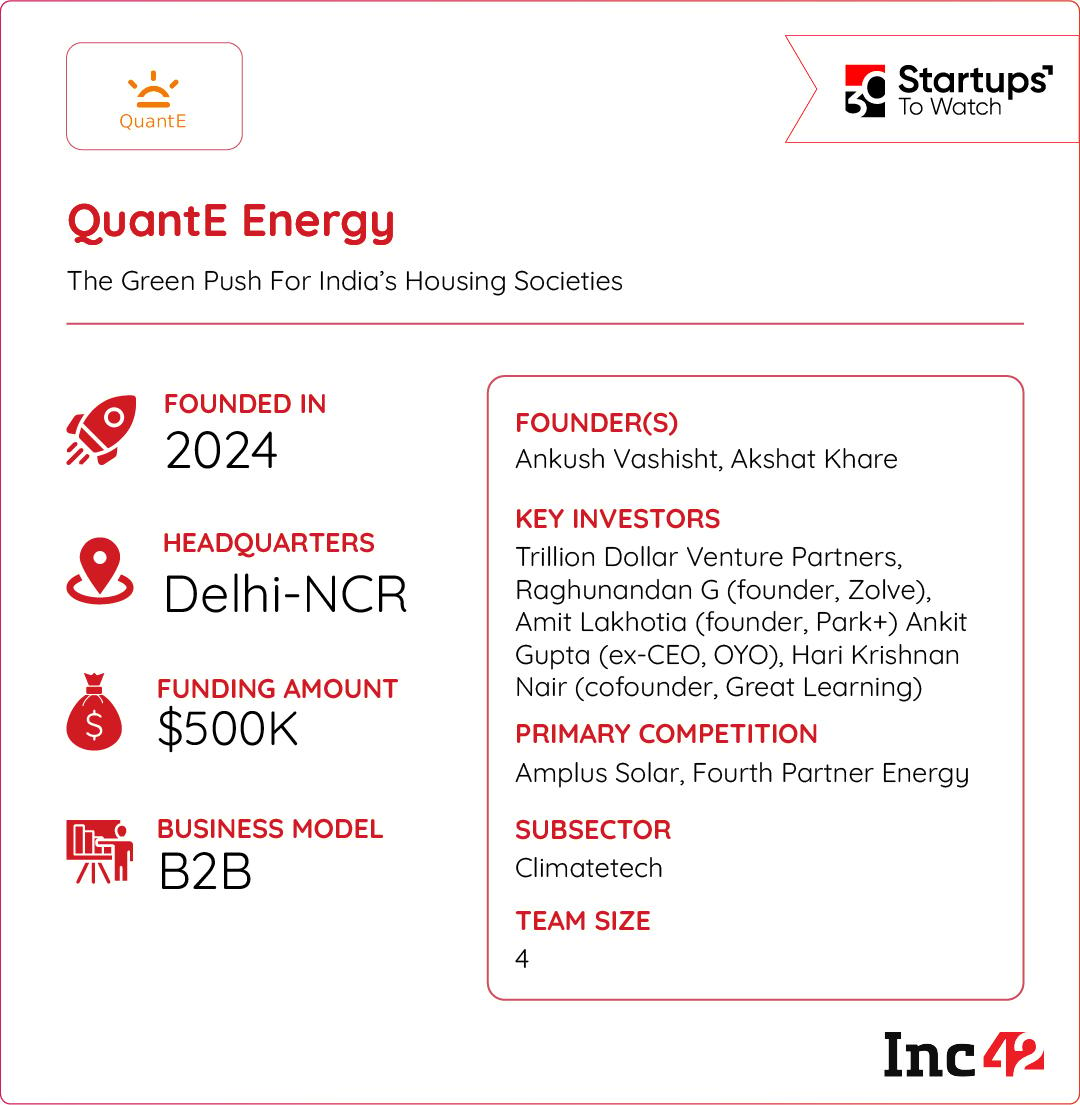
Adopting clean energy solutions like rooftop solar and EV charging remains effectively out of reach for the majority of Indian housing societies. High upfront costs, poor servicing, and opaque performance tracking make green energy adoption difficult despite rising electricity bills and regulatory pushes.
Recognising that residential societies were being left behind by the commercial solar boom, Akshat Khare and Ankush Vashisht founded QuantE Energy in 2024 to make green power accessible.
QuantE works on a subscription-like mode, whereby housing societies pay for solar power without bearing upfront installation costs. QuantE’s platform simplifies clean energy adoption by bundling financing, service, and performance guarantees with IoT-based monitoring, predictive maintenance, and EV charging support.
This provides societies with real-time insights into consumption and carbon savings, while making green power simple, affordable, and scalable.
Having already piloted its offerings in multiple residential societies across Delhi NCR and Mumbai, QuantE is vying for a piece of the broader Indian solar energy market, which is expected to become a $25 Bn market by 2030. By simplifying the transition to clean energy, the startup is looking to lower the barriers to adoption for India’s massive, yet underserved, urban housing market.
Sash.AI | Building Domain-Specific Agentic AI
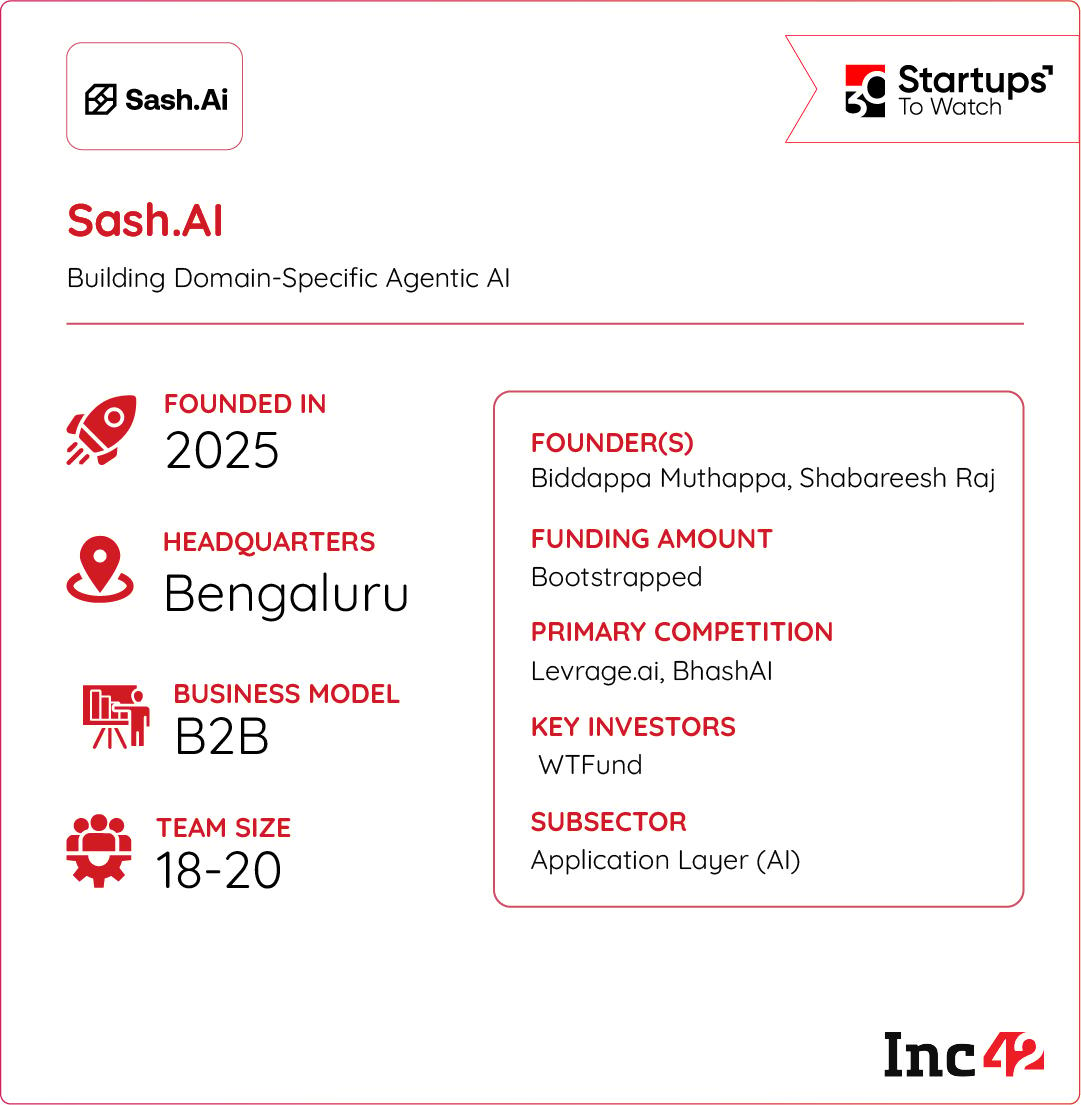
For global capability centres (GCCs) and large enterprises, adopting GenAI isn’t straightforward. Many projects fall short because they don’t align with domain needs, lack specificity, or fail to integrate into everyday workflows. To solve this, Biddappa Muthappa and Shabareesh Raj founded Sash.AI in 2025.
The startup builds domain-specific agentic AI agents for enterprises and GCCs. Its flagship suite, OrchestrAI, comes with 350+ prebuilt agents for functions like finance, procurement, HR, reporting, analytics, sales support, and more.
Beyond building tools, it offers end-to-end support in data engineering, GenAI workflows, analytics, DevOps/MLOps, and managed AI services. With flexible engagement models such as build-operate-transfer or fully managed services, it helps enterprises move from pilots to scalable AI operations.
The startup arrives at a crucial time, as GCCs in India are rapidly expanding and many are already prioritising AI and ML for automation and scale.
Sharmeeli | Elevating Daily Indian Wear
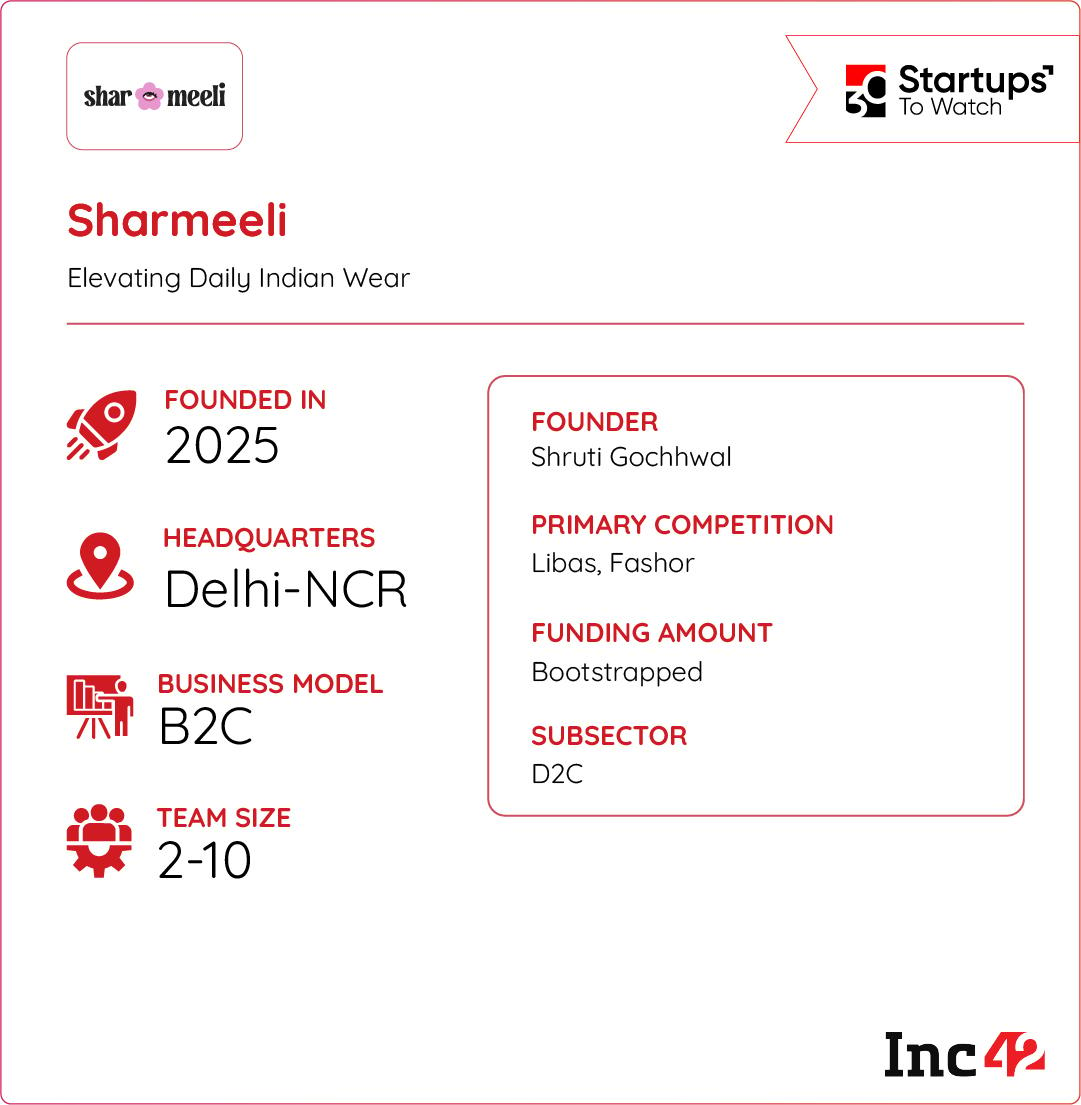
Founded in mid-2025 by ex-Zappfresh cofounder Shruti Gochhwal, ex-Army major Santosh Galidevara and Renu Solanki, Sharmeeli is a D2C ethnic fashion brand. It offers sarees, suits, shararas and other Indian wear.
The startup focusses on small-batch production and premium fabrics, keeping prices under INR 10,000, keeping quality without compromising fast fashion.
The idea came when Gochhwal, running bridal label Amaltas Couture, spotted a gap between heavy bridal wear and mass-market ethnic fashion. She envisioned well-made, design-forward Indian wear that’s modestly priced, artisan-inspired, and suitable for everyday use.
Today, Sharmeeli caters to urban women aged 20–40 who want elevated, wearable Indian wear. Initially targeting metros, the brand plans to expand online, tapping into India’s ethnic wear market, projected to exceed INR 1.68 Lakh Cr.
Trev Mobility | Charting The Future Of Premium EV Rides
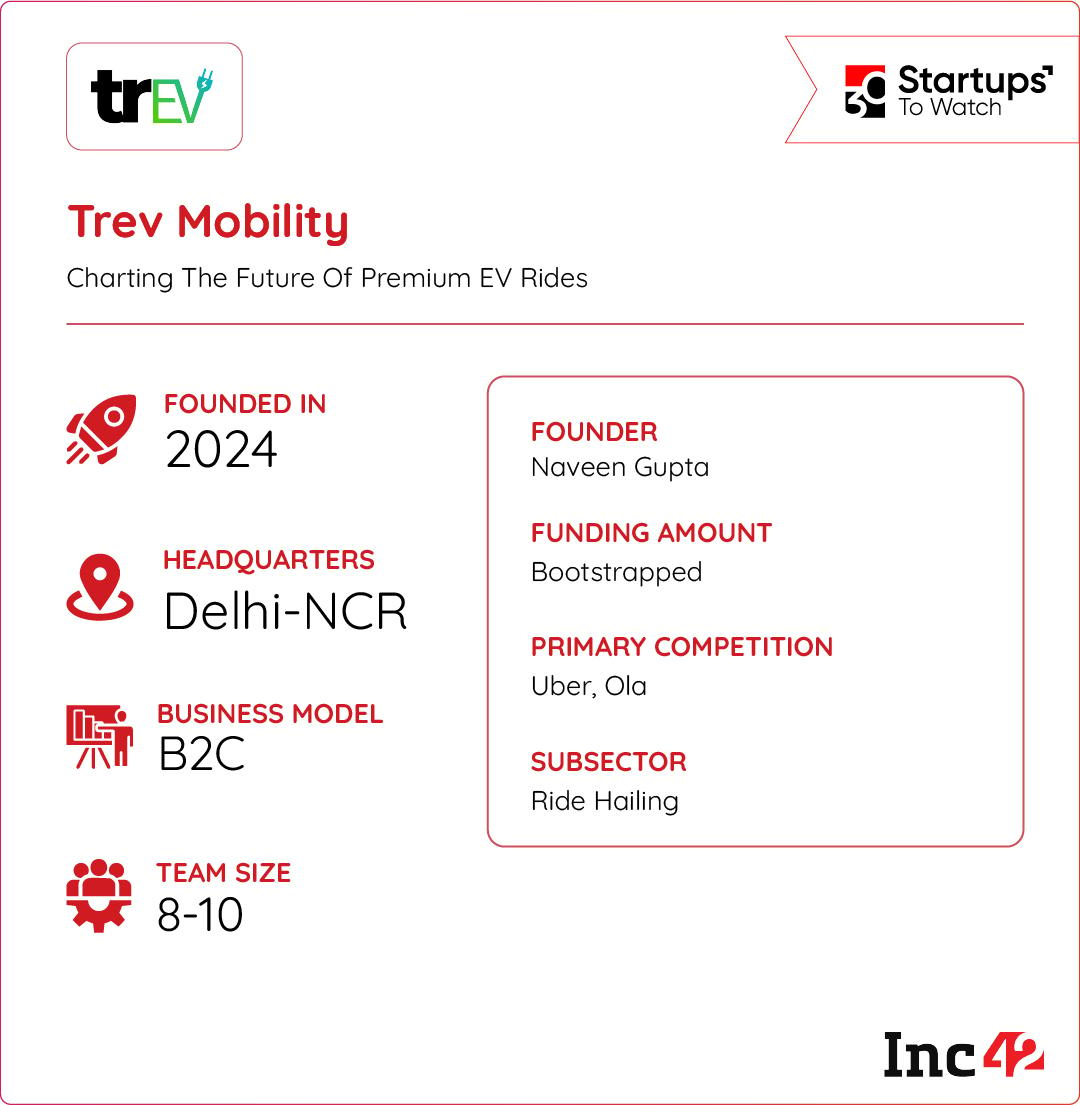
India’s ride-hailing market may be crowded, but one big gap still exists — a dependable, high-quality premium EV service.
Spotting this opportunity, ex-Zoomcar India head Naveen Gupta launched Trev Mobility in 2024. The startup runs an all-electric ride-hailing service using spacious SUVs that are equipped with comfortable interiors and ambient cabins.
Unlike traditional platforms, Trev employs its chauffeurs as full-time staff, giving it greater control over service quality and customer experience. The service currently covers airport transfers, outstation trips, hourly rentals, and local rides, with guaranteed pick-ups and a premium touch.
By blending the eco-friendly edge of EVs with luxury service, Trev Mobility is positioning itself to capture India’s premium ride-hailing segment and challenge the dominance of Ola and Uber.
UGX.ai | Helping MSMEs Take Control Of Production Lines
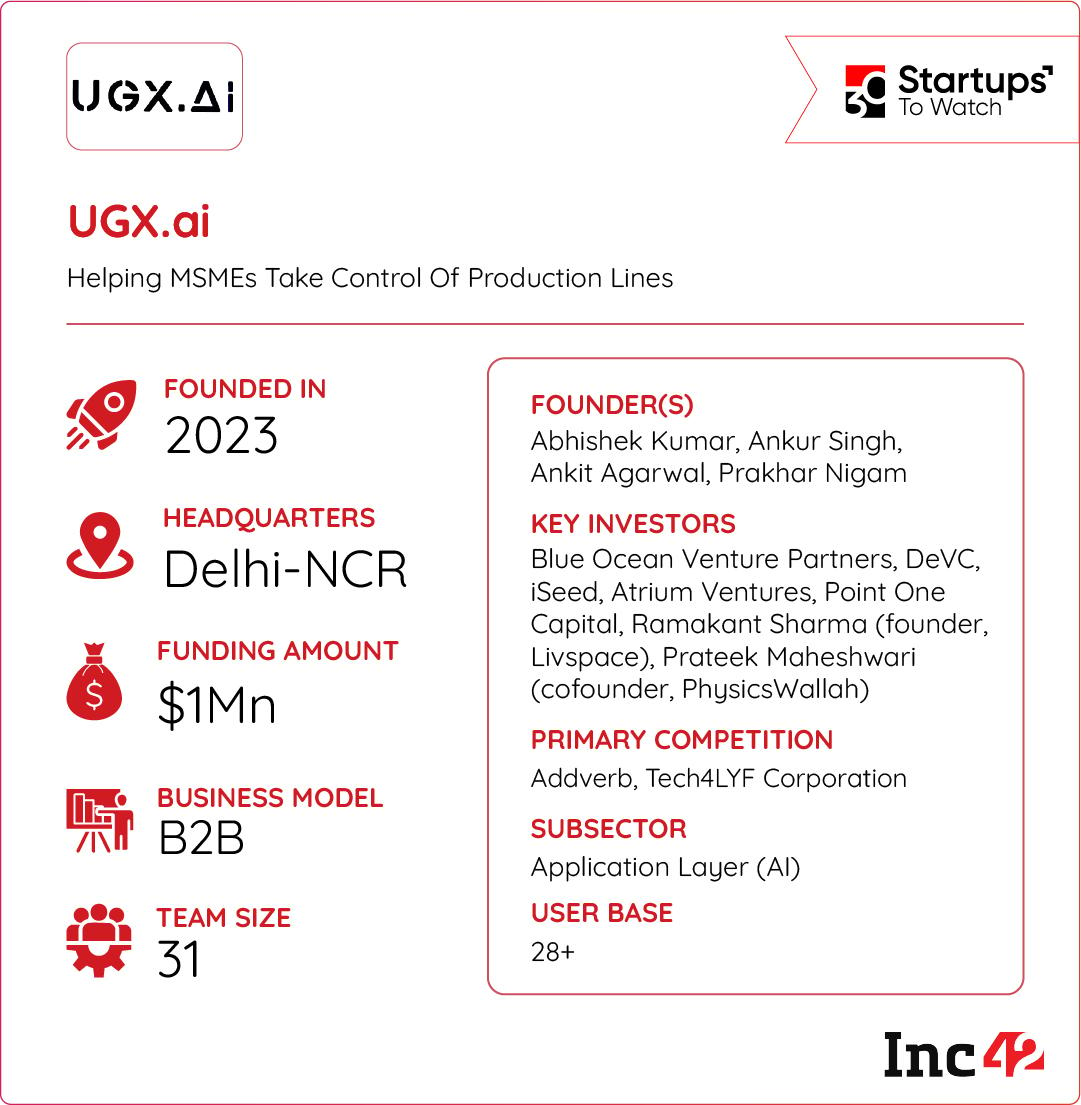
Manufacturers running multiple production lines often struggle with poor visibility into real-time operations. Data silos, manual tracking, and disconnected systems cause inefficiencies, quality issues, lower yields, and reactive maintenance. Without an integrated system, optimisation becomes both slow and costly.
To solve this, IIT-BHU and ISB alumni Abhishek Kumar, Ankur Singh, Ankit Agarwal, and Prakhar Nigam founded UGX.ai in 2025. The Gurugram-based startup has built an AI-powered, full-stack smart manufacturing execution system (MES) that blends edge hardware, middleware, and software to move manufacturers from manual to data-driven operations.
UGX.ai’s MES gives manufacturers real-time visibility into machine performance, traceability and floor operations. It also enables vision-based quality inspection, defect tracking, and optimisation with minimal latency.
The startup claims 5X growth over the past two years, serving 20+ enterprise customers in the automotive and electronics sectors.
With a recent $1 Mn seed round, UGX.ai now plans to strengthen its presence in India and expand globally.
Vaani Research | Supercharging Basic Bots
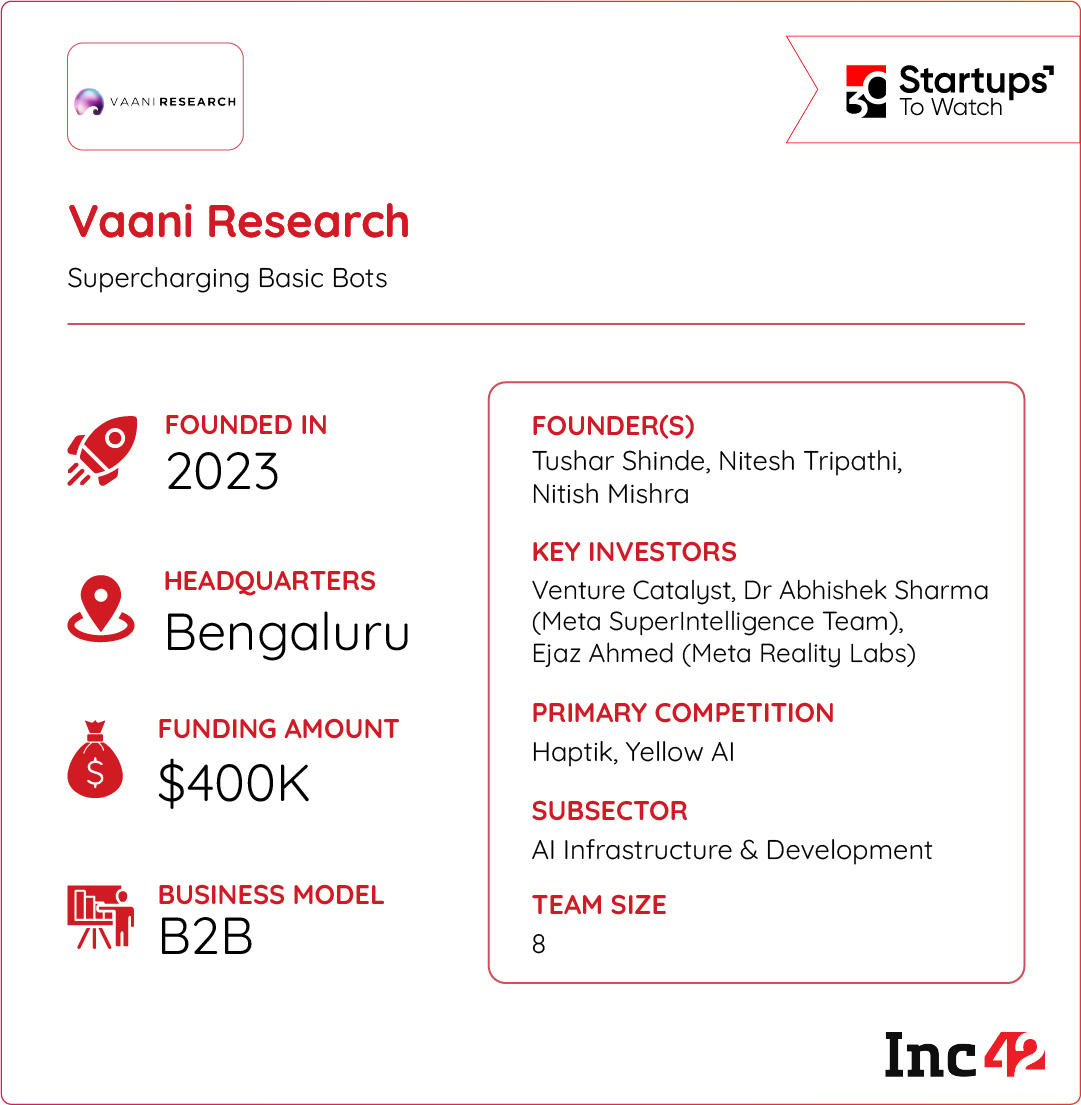
Enterprises using voice agents and contact-centre automation often hit a wall with basic bots that struggle with long, complex conversations, context switching, emotions, or compliance.
Even as voice AI and large language models (LLMs) have improved human-machine interactions, especially for customer-facing and frontline tasks, many systems remain fragile.
Noticing that most voice agents relied on off-the-shelf components and couldn’t handle long, branching dialogues, IISc alumni Tushar Shinde and Abhinash Khare decided to tackle a challenge that could limit GenAI adoption in sales and support.
In 2023, they founded Bengaluru-based Vaani Research Labs with a vision to build the ‘Stripe’ for Voice AI. The startup develops robust voice AI frameworks for enterprises, targeting customer support, lead generation, product qualification, and engagement lifecycles.
Its technology includes NLU, ASR, and TTS models optimised for real-time use, noise separation for background audio, and dialogue management capable of multi-turn conversations, context switching, handling interruptions, and addressing objections.
Vaani focusses on sectors like BFSI, insurance, telecom, and customer support, where complex workflows demand more than simple FAQ bots.
Voltanova | Solving Industrial Power Paradigm
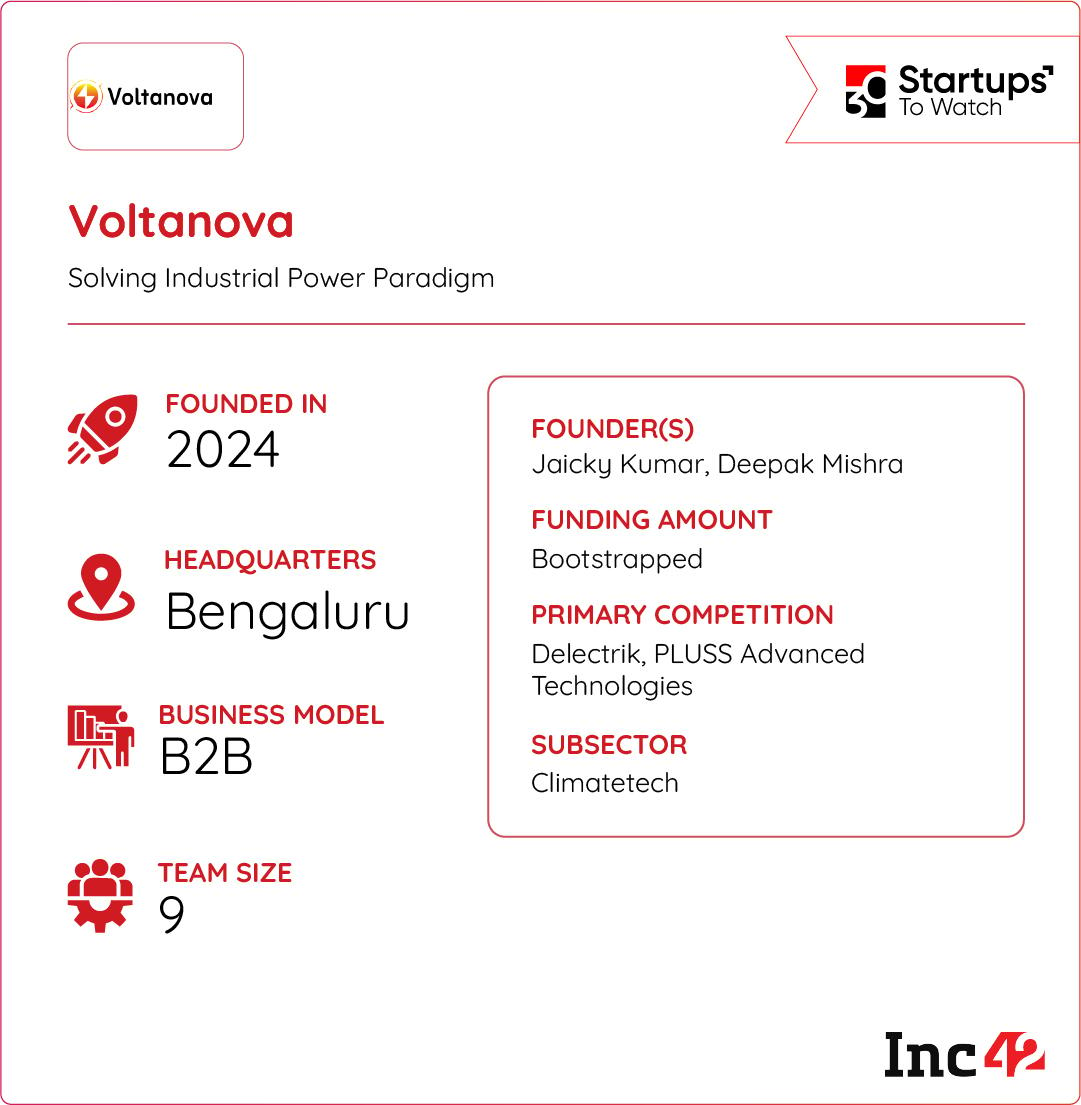
Founded by Jaicky Kumar and Deepak Mishra in mid-2024, Voltanova is a deeptech startup incubated at IISc Bangalore’s Foundation for Science, Innovation, and Development (FSID).
The founders noticed that while solar and wind power generation was on the rise, industries still struggled to store clean energy and use it. With this, they set out to create a thermal energy storage solution that is industrial-grade, scalable, and far more affordable than existing options.
Voltanova’s flagship product, the Thermal Battery Energy Storage System (Thermal BESS), stores renewable energy and converts it into high-temperature heat for industrial processes. It operates at 95% efficiency, runs continuously, is modular and scalable, and costs about one-fifth of traditional energy-storage or hybrid systems.
The solution also includes an AI-powered energy management platform to optimise performance and minimise waste.
Voltanova is targeting heavy energy-consuming industries such as textiles, cement, steel, chemicals, and food processing.
VyomIC | India’s First Private PNT Constellation
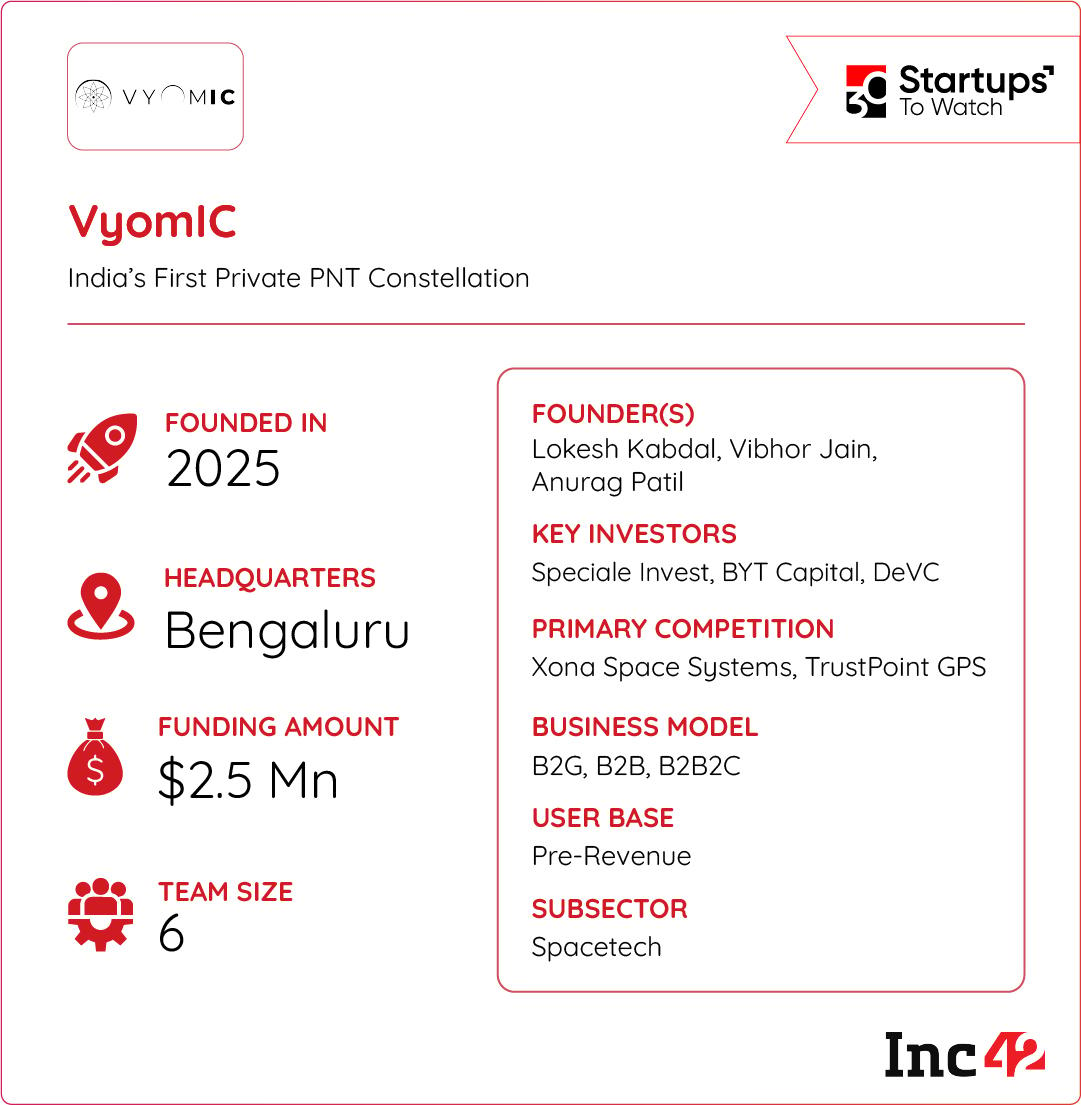
Sometimes, startups are born out of a crisis. For the IIT Madras students behind Avishkar Hyperloop, a student group working on high-speed transportation, a disruption during experiments became the spark for entrepreneurship.
During a drone light show in Gujarat, jammers deployed for the chief minister cut off communications, causing all 60 of Avishkar Hyperloop’s drones to lose their base station link.
For Lokesh Kabdal, Vibhor Jain, and Anurag Patil, the incident highlighted India’s need for far more resilient navigation and timing infrastructure.
This insight led them to launch VyomIC, India’s first private global PNT (Positioning, Navigation, Timing) satellite constellation. Unlike legacy GNSS systems, which can struggle with precision and are vulnerable to jamming or spoofing, VyomIC promises 100–1000x stronger encrypted signals and centimetre-level positioning accuracy.
VyomIC’s flagship PNT constellation aims to deliver next-gen navigation worldwide. The startup is also building terrestrial PNT systems for industrial and defence use cases. Its revenue comes from hardware sales, subscription-based secure services, and public-private partnerships.
Having completed its constellation architecture design, VyomIC is preparing for a PNT payload demo in 2025, with plans to launch an In-Orbit Demonstrator by 2027 to validate its technology in space.
[Edited by: Shishir Parasher]
]]>
